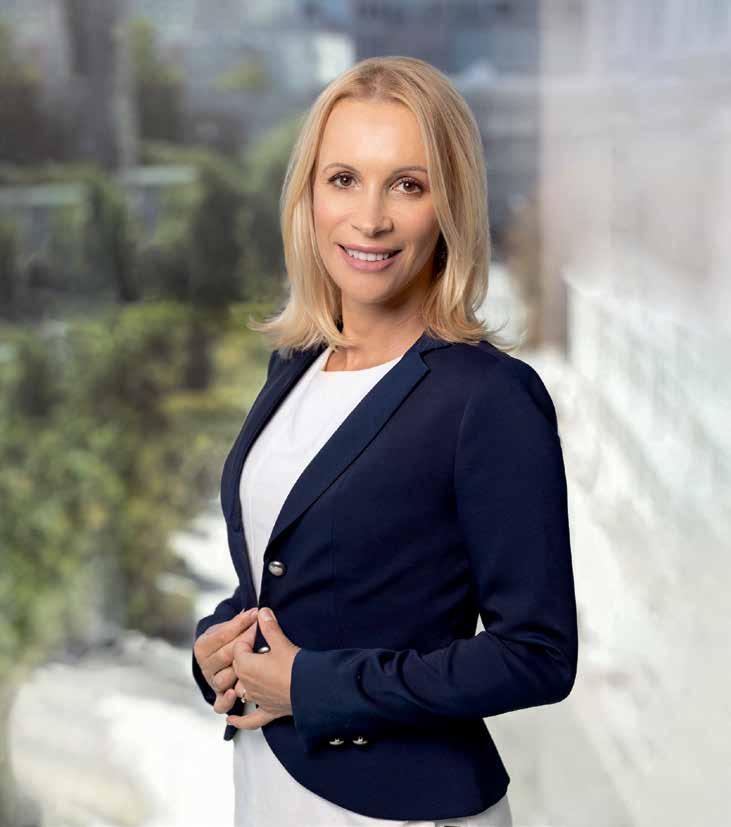

For daily news visit us at wbj.pl Since 1994 Poland’s leading business magazine in English WARSAW BUSINESS JOURNAL FEBRUARY - MARCH 2023 ~ No. 1 (76) PLUS: BACARDI-MARTINI BUILDING GROWTH THROUGH LOCAL TALENT AND UNIQUE WORK CULTURE WE STAND WITH UKRAINE ANNA DUCHNOWSKA Investment trends & opportunitues Exclusive: Neo-Świat's Managing Directors share insights on real estate market and company's success Ghelamco Poland's Jarosław Zagórski talks building sustainable office spaces in line with ESG principles The Future of AI: Can Self-Thinking Devices Upset the SEO Market? Visit us online


8 In Review
News
14 Opinion
A year of challenges for Poles and AI is coming by Sergiusz Prokurat

19
Lokale Immobilia
News
Five Questions for Anna Duchnowska
The future of Warsaw looks bright
Exclusive Interview: Managing Directors of Neo-Świat Paweł Brodzik and Rajmund Węgrzynek Interview by Morten Lindholm
Interview with Richard Hallward, CEO and founder of CEEQA
Thought Leader: Jarosław
Zagórski, Commercial and Business Development Director at Ghelamco Poland
37 Investing in Poland
Pomeranian investments
City in Focus: Łódż
PAIH
40 Interview
Managing Director CEEBB Katya
Chmykhova and HR Director CEEBB
Aleksandra Paramuszczak of Bacardi-Martini CEEBB
Company Spotlight: Raben Group
Viola von Cramon-Taubadel, MEP and vice-chair of the delegation to the EUUkraine Parliamentary Association Committee Interview By Nikodem Chinowski
Piotr Bujak, chief economist at PKO Bank Polski Interview By Nikodem Chinowski
52 Features
Poland Invests In Climate Tech

Start-Ups by Anna Rzhevkina
Is Poland ready for the Euro by Anna Rzhevkina
What to do and not to do in times of crisis.
 by Karolina Klimek-Kaźmierczyk
by Karolina Klimek-Kaźmierczyk
65 Tech
News
On Turing-test with chatbots and blog writing by Beata Socha
69 Life + Style
A Historic Gem Reimagined for Modern Times by Alex Webber

Varietal of the Month by Wine
Expert Peter Puławski of dobrawina.pl
72 Events
2 FEBRUARY - MARCH 2023 WARSAW BUSINESS JOURNAL PORTRAIT BY KEVIN DEMARIA FEB/MAR
16 60
52 69

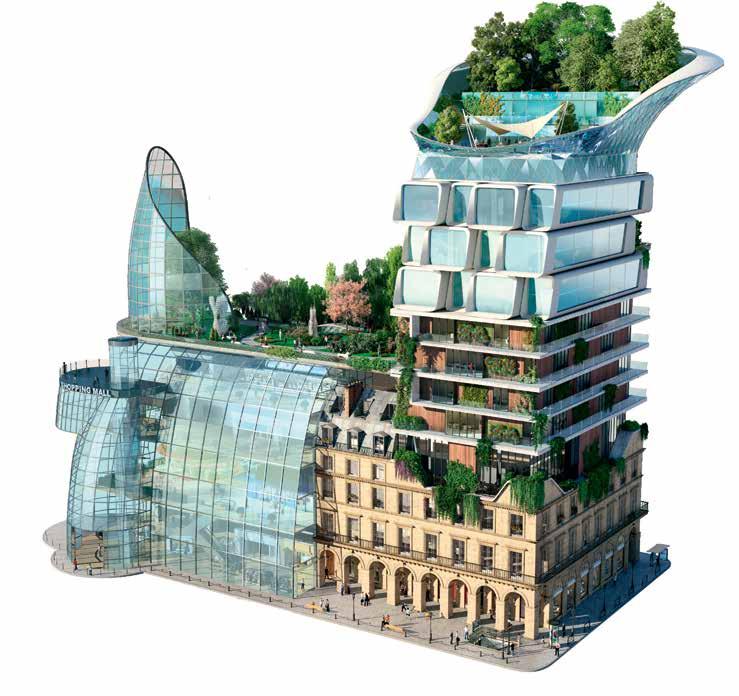
IN A CHANGING WORLD, TOMORROW’S REAL ESTATE IS BUILT TODAY. Real Estate for a changing world DEFINE YOUR BUSINESS WITH US We will assist you with the following services: Capital Markets, Property Management, Transaction, Project Development and Consultancy, ESG, Dedicated Market Reports, Valuation. Visit us in our office at 78 Grzybowska Street, Warsaw Phone: +48 22 653 44 00 bnppre.pl
PUBLISHER'S NOTE
BRING SPRING ON…
It feels like the winter has been very long this year. The Warsaw gloom and cold have been upon us for about four months now, but it’s probably not just the weather that influences our emotions. The general mood of society seems burdened by the war next door, extreme inflation and a general uncertain outlook.
If we look at the data that Piotr Bujak, chief economist, presents in this issue of WBJ (pages 48-51) there is confirmation by data as to why my feelings are so tangled. The GDP drop YTY in Poland has been dramatic over 2022, ending in Q4 with a small plus, while the forecast for this quarter and the coming ones are around 0 (in 2022, Q1 was 8.6% growth YTY).
The biggest surprise in the calculation of GDP is the collapse in consumption. In Q4, it fell by 1.5% at a time when the Polish population is 2+% greater (due to immigration), and calculating the per capita consumption shows a dramatic drop. What is the reason for this?
Consumers reduced spending due to the rapid spike in inflation. The interests on loans and credit jumped high, and radical increases in energy prices may have also contributed to this.
Some moments of optimism from the last month
Biden’s visit to Warsaw - NATO’s support, Poland’s courage and engagement
More and more Polish-based companies are taking responsibility and investing in sustainable energy sources
The peak of inflation is behind us, prices of energy are decreasing, and unemployment data is stable
But what about companies, investments, and business? In our cover interview with Anna Duchnowska, (pages 22, 24), managing director of Investment Management Europe for Invesco Real Estate, she shares her thoughts on challenges and opportunities for Polish and CEE real estate investments.
During my talks with Neo-Świat’s Paweł Brodzik and Rajmund Węgrzynek (pages 28-31), we discussed that despite the current challenging moment, even now, and definitely in the mid and long term, there is still great potential in Polish real estate investments to catch up with demand. The new ESG regulations influencing the market should also impact this.

Polish cities and regions
Poland’s major cities and regions are still doing well, showing ambitions to improve the lives of its citizens, attracting strong foreign investments, delivering talent, and opportunities for companies to thrive. In our section “Investing in Poland” (pages 37-39), we shed light on a few of them.
It is an election year in Poland (autumn 2023). The Polish success story from the last three decades has been challenged over the last three years by political disruption, pandemic, and geopolitical issues. It is an important year for Poland, a year to set the agenda for the coming decade so Poland’s influence and prestige in Europe and the rest of the world can continue its rise.
I hope you will find our selection of articles and materials interesting and that spring will bring you lots of new energy and a positive impact.
4 FEBRUARY - MARCH 2023 WARSAW BUSINESS JOURNAL
MORTEN LINDHOLM
PORTRAIT BY PIOTR NAREWSKI, ICONS SHUTTERSTOCK


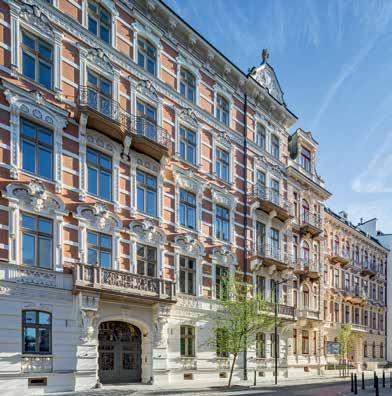



GUESTS THIS ISSUE
Anna Duchnowska
Anna leads the European Asset Management division of Invesco Real Estate, overseeing a team of 28 professionals in seven European offices. She is also a member of the Advisory Board of the Entralon Real Estate Club and will attend their CEE Retreat on 6-7 June 2023. She possesses 20 years of professional experience in real estate asset management, investment, leasing, and finance. She is a Fellow of the Association of Chartered Accountants (FCCA) and a Member of the Royal Institute of Chartered Surveyors (MRICS).
Interview on page 22
Piotr Bujak
Since 2016, Bujak has been the head of the Economic Research Department and Chief Economist at PKO Bank Polski, Poland's largest bank. Over his more than 20-year career, he has gained extensive experience in international financial institutions, including training in econometric modeling, forecasting, and mathematical methods in financial markets. He is also the co-author of several books and numerous articles on economics.
Interview on page 48
Viola von Cramon-Taubadel
As a member of the Greens/EFA, she has served in the European Parliament since 2019. She is a member of the Committee on Foreign Affairs (AFET) and a deputy chairperson of the delegation to the EU-Ukraine Association Parliamentary Committee. She is an agricultural economist from Germany.
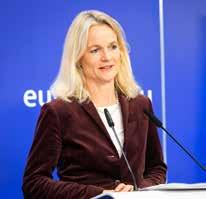

Interview on page 46
CONTRIBUTOR
Peter Pulawski
A visionary wine merchant and negociant, Pulawski has built a chain of stationary and online specialty wine shops in Poland under the dobrewina.pl brand. He has made his mark on the dynamically growing Polish market by leveraging market data and consumer preferences in combination with meticulous product selection and inventive marketing communication. Since 2022, dobrewina.pl has also offered sommelier workshops and wine education in the company's refurbished 100-year old horse stable or at any chosen location.

Article is on Page 71
Morten Lindholm
Editor-in-Chief/Publisher mlindholm@valkea.com
Kevin Demaria Art Director kdemaria@valkea.com
Jessica Sirotin Editor
Krzysztof Maciejewski Business & Web Editor kmaciejewski@wbj.com
Contributors
Nikodem Chinowski Sergiusz Prokurat
Anna Rzhevkina
Beata Socha
Alex Webber
Sales Izabela Kaysiewicz ikaysiewicz@valkea.com
Katarzyna Pomierna kpomierna@valkea.com
Print & Distribution
Krzysztof Wiliński dystrybucja@valkea.com
Event Director, Valkea Events
Magda Gajewska mgajewska@valkea.com
Contact:
phone: +48 22 257 75 00 fax: +48 22 257 75 99 e-mail: wbj@wbj.pl WBJ.pl
For enquiries,subscriptions-related please email us at wbj@wbj.pl
WarsawBusinessJournal @wbjpl
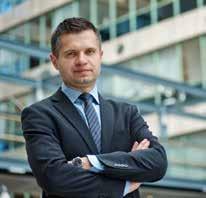
All photographs used in this issue are courtesy of partners and companies unless specified otherwise.
Copyright © 2023 by Valkea Media SA
All rights reserved. This publication or any portion thereof may not be reproduced or used in any manner whatsoever without the express written permission of the publisher.
Published by ul. Jerzego Ficowskiego
6 FEBRUARY - MARCH 2023 WARSAW BUSINESS JOURNAL
15 Valkea Media S.A.01-747 Warszawa Tomasz Opiela, CEONIP: 525-21-77-350 www.valkea.com To subscribe through RUCH SA:
prenumerata@ruch.com.pl, 801
803
www.prenumerata.ruch.com.pl,
800
C M Y CM MY CY CMY K

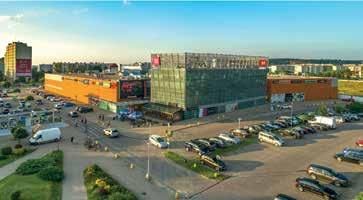
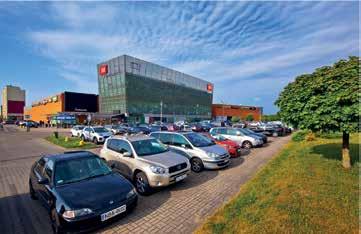


POLAND'S HIGH-SPEED RAIL NETWORK COULD BE EUROPE'S MOST MODERN IN 20 YEARS, SAYS EU OFFICIAL
Poland could have the most modern high-speed rail network in Europe within two decades, according to Kristian Schmidt, the head of the European Union's Directorate-General for Mobility and Transport. The Solidarity Transport Hub project envisages building a new airport and almost 2,000km of high-speed rail links, with CPK, the company behind it, signing a €1.5bn ($1.8bn) design agreement last year. Schmidt said that Poland will also play an important role in integrating Ukraine into the EU's transport network. However, some experts have questioned the viability of the project, including a new "mega-airport", in a post-Covid world.
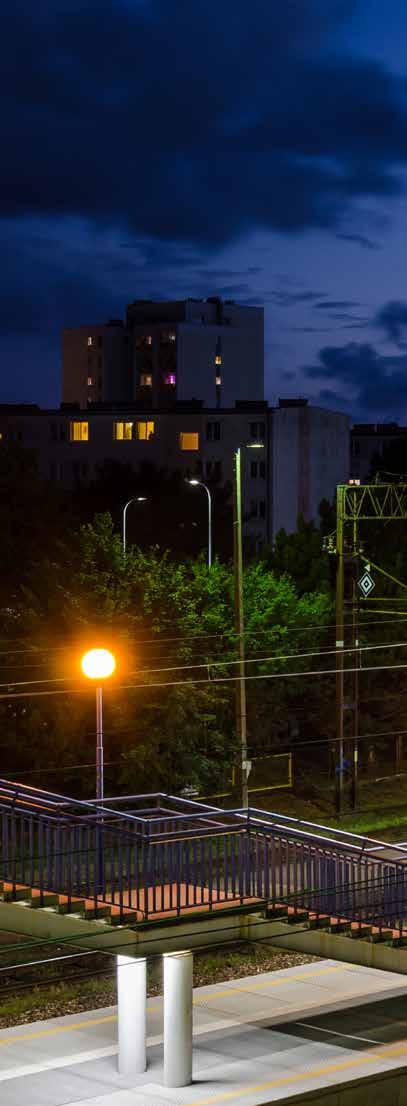
8 FEBRUARY - MARCH 2023 WARSAW BUSINESS JOURNAL
IN
REVIEW
SHUTTERSTOCK
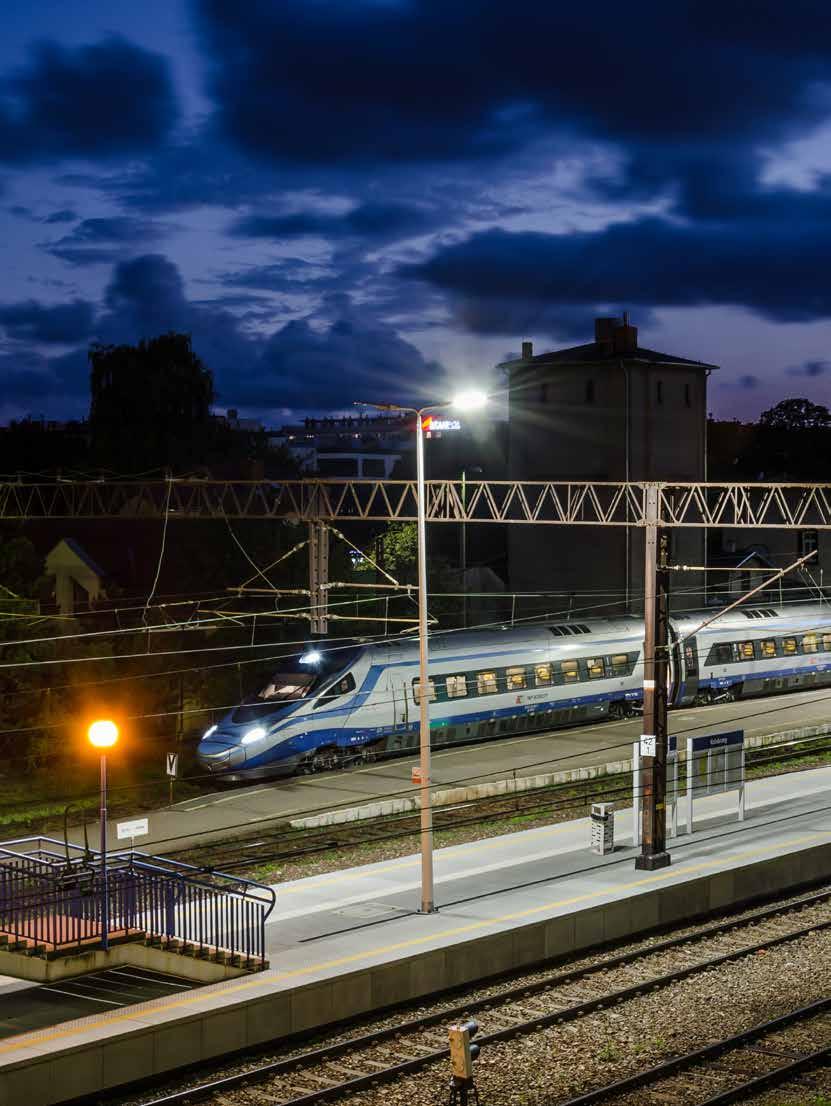
BUSINESS
Polish retail and industry under strain from war in Ukraine
The effects of the war in Ukraine are being felt by Polish companies, with the increase in the prices of materials and raw materials affecting 44% of Polish companies, and 42% pointing to an increase in operating costs, according to a recent report by the Polish Economic Institute (PIE).
“The inclusion of emigrants from Ukraine in the socio-economic development of Poland is becoming an opportunity for our country, but attracting them is still a challenge,” said Aleksandra Wejt-Knyżewska from PIE.
The research showed that nearly half of the companies felt the impact of the war on the employment of Ukrainian workers, with industries that use seasonal workers or workers without specialist qualifications experiencing an improvement in employment because of the influx of Ukrainians.
SOCIETY
Most Ukrainian refugees found jobs in Poland
Most working-age Ukrainians found employment in Poland, more than half of them within the first three months of their stay, Rzeczpospolita reports.
Almost one in three has already changed employers.

As much as 82% of adult refugees from Ukraine took up a job in Poland, and among people of working age, this percentage reaches 84%, the latest survey of the employment agency Migration Platform EWL showed. More than half of adult refugees (56%) found employment in the first three months of their stay, although only 8% of them had visited Poland before for work or business purposes.
“Such a high level of employment among Ukrainian refugees already in the first months of their stay in Poland proves not only their determination in taking up work, but also the openness of Polish entrepreneurs to new employees,” says Andrzej Korkus, President of EWL Migration Platform.
ENERGY Energy companies to add 22 GW by 2036
Energy producers will add 22 GW of generation capacity by 2036, according to the President of the Energy Regulatory Office. Sixty-nine energy producers had to submit investment plans in new generation capacity to the regulator for the years 2022-2036.
They plan the largest investments in natural gas (9.8 GW), wind farms (5.2 GW) and photovoltaics (5.7 GW) segments.
NUMBERS:
72.53% the drop in value of housing loans granted in Q4 2022
(y/y, AMRON-SARFiN)
5% unemployment rate in January
(GUS)
13.5% increase in corporate wages y/y in January
(y/y, GUS)
2.6% industrial production increase in January (y/y, GUS)
10 FEBRUARY - MARCH 2023 WARSAW BUSINESS JOURNAL
IN REVIEW News
QUOTE: Joe Biden
“...in the moments of great upheaval and uncertainty … knowing what you stand for is most important, and knowing who stands with you makes all the difference. The people of Poland know that. … Because that’s what solidarity means. Through partition and oppression, when the beautiful city was destroyed after the Warsaw Uprising, during decades under the iron fist of communist rule, Poland endured because you stood together.”
US President Joe Biden said during his visit in Warsaw, in February 2023.
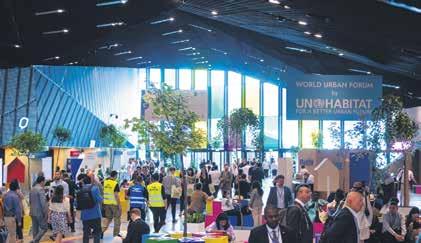




ENERGY
Polish-Korean nuclear energy agreement expected in mid-year
Minister of State Assets Jacek Sasin expects Poland and South Korea to sign an intergovernmental agreement on cooperation in the field of nuclear energy in the middle of the year.
Polska Grupa Energetyczna (PGE) and ZE PAK together with Korea Hydro & Nuclear Power last year signed a letter of intent for cooperation in the construction of a nuclear power plant in Pątnów.
“In March, there will be another agreement …, which will provide for the appointment of an intergovernmental Steering Committee that will not only monitor the construction but also coordinate all activities on the government’s side,” Sasin said on Radio Zet.
ENVIRONMENT No coal furnaces in Warsaw from October
A ban on burning coal will come into effect in Warsaw from October of this year, with residents no longer allowed to use it as a heating source.
“The upcoming heating season in the capital should be without coal,” Magdalena Młochowska, the coordinator for Green Warsaw at the City of Warsaw Office, said. Since January of this year, unclassified coal-fired furnaces have been illegal. Around 4,400 of them still remain in the capital. Those who have not yet replaced their coal-burning furnaces with greener heating sources may face fines if they continue using them.
AUTOMOTIVE Electric cars sales up 56% in January
In January, there were 67,000 electric cars in Poland, an increase of 2,376 units on a monthly basis, and 56% more compared to January 2022, according to the Electromobility Counter report. Fully electric cars accounted for 51%
Global Growth Forecasts 2023
Despite adversity, the Polish economy continued on its growth path in 2022, propelled by strong labor market data. As expected, economic growth weakened in Q4, 2022. Yet net exports are expected to contribute to growth in 2023, supporting a positive outlook for the entire year.
of electric cars and the remaining 49% were plug-in hybrid vehicles.The managing director of the Polish Automotive Industry Association Maciej Mazur said that to maintain the upward trend, rules for granting subsidies for the purchase of electric cars should be updated.
ECONOMY Poland’s economic outlook stable – S&P
S&P Global Ratings agency has affirmed Poland’s long-term foreign currency rating at “A-”, the agency said in a press release. The rating outlook remained stable.
“We expect Poland to be able to withstand most war-related macroeconomic shocks over the next two years. This resilience is due to the diversification of the Polish economy, the flexibility of the labor and product
markets, and an educated workforce. We also note Poland’s membership in the EU and NATO as a favorable factor, as well as the relatively secure outlook for energy supplies, which is linked to the government’s actions directed at minimizing energy imports from Russia.” the report reads.
ECONOMY Over a quarter of Poles still work from home or in a hybrid model
In the fourth quarter of 2022, 28% of working Poles said they worked in a remote or hybrid model, 6% down from the first quarter of 2022, according to a Pracuj.pl survey. By comparison, in the fourth quarter of 2021, the percentage of workers doing fully remote or hybrid work was 35%.
12 FEBRUARY - MARCH 2023 WARSAW BUSINESS JOURNAL
News VISIT WARSAW
IN REVIEW
-3% Russia 0.3% Iceland 2.9% Ireland 4.0% UK -0.6% SE -0.1% FI 0.5% Norway 2.6% DE 0.1% France 0.7% Greece 1.8% Italy 0.6% Spain 1.1% RO 3.1% Poland 0.3% 0.2% 3.0% Japan 1.8% China 5.2% Australia 1.6% Libya 17.9% Brazil 1.2% Guyana 25.2% United States 1.4% Mexico 1.7% Canada 1.5% Chile -1.0% 0% 3% 6% 9%
India 6.1% 6.7% 7.3%
Sources: IMF Economic Outlook (Oct 2022 and Jan 2023 update), Macrotrends, Trading Economics
VISIT WARSAW
MIPIM 2023
Warsaw - smart people, smart technology, smart city

Our Partners at MIPIM 2023
um.warszawa.pl
AT STAND R8.D1
A YEAR OF CHALLENGES FOR POLES

Inflation, recession, elections – these are the keywords for 2023 in a nutshell. Unfortunately, the not very optimistic forecasts for the Polish economy may be of little importance compared to the upcoming election. The result will be crucial for the country's future, as it will decide in the long term which institutions will prevail.
BY SERGIUSZ PROKURAT
we like to know what's about to happen, don't we? It gives us a sense of being in control of our own destinies. After a temporary post-Covid revival, we have been facing many challenges. The Organization for Economic Cooperation and Development (OECD) has prepared a forecast entitled "Confronting the crisis," which contains an assessment of the global economic situation and member states, including Poland. The OECD pre-
dicts that global economic growth will slow to 2.2% in 2023. Even though OECD analysts expect Poland to face high inflation, growing unemployment, and further increases in interest rates next year, it doesn't need to end like this.
During the COVID-19 pandemic, it seemed that it could not be worse. However, according to a GfK survey, as many as 60% of Poles believe that their financial situation has deteriorated during 2022. Uncertainty is growing, which harms the economy because people inundated with disturbing information refrain from buying furniture, cars, or apartments. The most critical challenges in Europe include inflation, a potential escalation of Ukraine's war with Russia, a global recession, a possible increase in unemployment, and wage increases below inflation. In mid-December, the European Central Bank assumed that inflation in 2023 would fall to 6.3% from 8.4% in 2022. Significant increases in prices continue in Germany and Italy, as well as in France and Spain. Inflation will start to slow down in the second half of the year. According to the forecasts of the National Bank of Poland, the trend in Poland should be similar, contrary to OECD predictions. In the first half of the year, inflation will still be high. Only in the best possible scenario, in the second half of 2023, might it fall below 10% and gradually decrease. However, it will not be the case that one day we will wake up and there will be no more inflation. Unfortunately, it will be a slow and gradual process.
14 FEBRUARY - MARCH 2023 WARSAW BUSINESS JOURNAL
SHUTTERSTOCK
OPINION
On the other hand, there is no reason to expect an increase in the unemployment rate in Poland –perhaps by only about 1 percentage point – political decisions to choose higher inflation over higher unemployment result in a poorer society. The unemployed group can be loud and visible, which is not something the ruling party is keen to face in the election year. Contrary to the situations we hear about in the US, redundancies will be a last resort in Poland due to the structural shortage of employees, resulting primarily from unfavorable demographic trends that are taking place not only in Poland but also in most European countries. As a result of the slowdown in the labor market, recruitment will freeze, and wage growth will be limited. Average nominal wage growth will remain below inflation.
Unfavorable conditions, higher interest rates, and higher inflation, which invisibly reduce the value of savings, mean many challenges for investors, borrowers, and ordinary consumers – which means different problems for everyone. For example, as consumers, we usually pay attention to the price of products before the purchase. Unfortunately, checking the price will not protect us from overpaying in the store. It's worth checking labels to ensure we are not falling victim to shrinkflation, which affects product downsizing. Reducing the volume of the product or using other forms of impoverishment of the product
while maintaining the same price will be visible in 2023. A famous example is the changing weight of a block of butter. Once a standard block weighed 250 g, then we became accustomed to 200 g. Now recently more and more producers are downsizing butter to 180 g.
Two fundamental events will impact the forthcoming year in Poland. In 2022, the world was irrevocably changed by Russian aggression, and it is not yet known whether it will not shake the world again; the second event is the elections in Poland, scheduled for Autumn 2023. They will decide whether Poles will reject the rule of PiS or give the party a third term. We may be witnessing specific election promises that will increase inflation –depending on the scale of the "gift" that the government is preparing. The upcoming elections in 2023 in Poland will be won by the party that manages to convince Poles that it can guarantee less uncertainty - greater security is beyond anyone's control at this point. The long-term struggle over whether Poland should be liberal or social has ceased to be valid since 2015. In politics, only gifts for society count – social benefit programs like the Family 500+ program, credit holidays, and 13th and 14th retirement pensions. Politicians no longer want to compete over ideas but rather with social gifts.
The 2023 elections will decide whether the institutions of social Poland – somewhat unwilling towards the EU, entrepreneurship, or religious and sexual dissimilarity – will strengthen. In the worst scenario, we may even witness a long-term "peronization" in thinking about the economy in Poland. The term comes from the name of a famous Argentine politician. In the 1950s, when Juan Peron, the leader of the socialist movement, took over the government in Argentina, he willingly nationalized the economy, supported state-owned companies with money, and pumped public funds into economic projects planned by politicians. The heads of large companies were elected not by managers but by people who obeyed the president's administration. What happened next? In the long term, state-owned companies ceased to be effective, resulting in inflation, currency depreciation, high budget deficits, difficulties repaying foreign debts, and finally, the economy's collapse and bankruptcy. The state budget generously financed social goals, but the state restricted democracy in return. Although Peron died a long time ago, it is still claimed that Argentina is ruled from "Peron's coffin" – his successors who continue to pursue a policy of social gifts because it is a path that is not easy to get off of. Considering the hypothetical direction in which Poland is heading, this comparison does not seem so improbable.
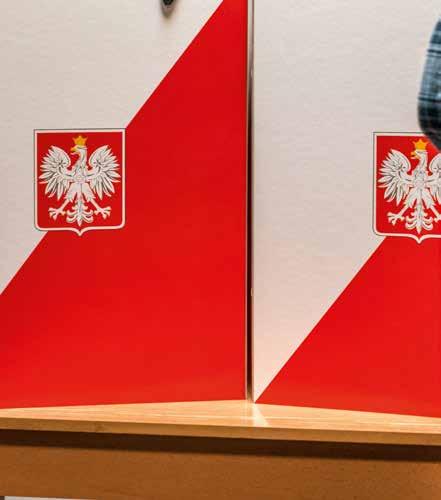
WBJ.PL 15
The upcoming elections in 2023 in Poland will be won by the party that manages to convince Poles that it can guarantee less uncertainty
AI IS COMING
BY SERGIUSZ PROKURAT
the development of Artificial Intelligence (AI) is something akin to summoning a demon. It's a lot of fun for everybody involved, there is a great deal of curiosity about how it will turn out, and everyone expects that somebody understands the consequences. The only thing needed to make to happen is a proper sacrifice, i.e., enough funding. So the question is, what if, in the end, against all odds, one day, this demon actually rises?
The race to create self-thinking devices and software is on. So far, such things don't exist. In late 2022, OpenAI released ChatGPT, a chatbot that answers questions in simple, concise language. However, it is not Artificial Intelligence but rather automated machine learning algorithms applied to a massive corpus of text to respond to users' requests. ChatGPT can pass a high school final or a university exam, and even write a scientific essay that could be published in a journal. Midjourney, Dall-E2 can create an original image. SynthesiaIO can generate a video. The effect of popularizing such tools will be a shift in the functioning of the education sector and the approach to content. The technology of generating images and content enables the creation of original photos from actual photos from social media, posing numerous opportunities and threats. Everyone wants to have Artificial Intelligence today – even if it is makeshift. As a result, the stocks of companies creating AI solutions are rising dramatically in value.
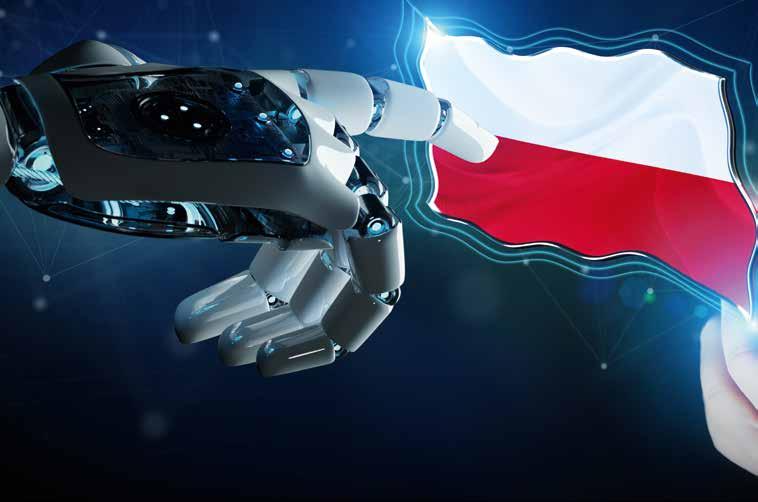
16 FEBRUARY - MARCH 2023 WARSAW BUSINESS JOURNAL
The race to create self-thinking devices is picking up speed and anticipation for the next generation of Artificial Intelligence is high. But what happens when it gets here?
OPINION SHUTTERSTOCK
Meanwhile, Artificial Intelligence is only a simple reflection of human intelligence. It will tell us what we want to hear or see – because it is supposed to work for us, right? One of the most ambitious government projects in history was inaugurated in Chile in 1970, when the presidency of Salvador Allende began. He wished to use intelligent computers to build a socialist utopia. The Chilean government at the time wanted to nationalize essential segments of the economy, control commodity prices, and expand the welfare state system. Cybersyn, a modern machine with a futuristic interface in a central control room reminiscent of the interiors of the Star Trek TV series, was intended to communicate via telefacsimiles sent by officials. The data was immediately transported hundreds of kilometers away to the hands of analysts who would set prices. Cyberfolk computers were supposed to analyze social moods and propose real-time actions to politicians. Yet, the failure of this project, and the subsequent economic and political catastrophe in Chile, have not discouraged politicians from similar solutions.
The appeal of disruptive innovation that might change the world forever has never faded. In particular, AI's potential is especially attractive to security services. Effective surveillance and intelligent eavesdropping on every telephone conversation is a worst-case scenario that will end only in the type of dystopia we know from sci-fi movies. This unbridled enthusiasm is why initiatives are needed to regulate the use of AI – nationally and internationally.
There is an AI race going on in the world right now. The competitiveness of economies leading in the race to construct technologically advanced solutions, including AI, closely correlates with their level of innovation. Poland has its own strategy with short, medium, and long-term goals. According to the government report "Policy for the Development of Artificial Intelligence in Poland from 2020," it is necessary to involve the public sector and the largest state-owned companies in financing AI projects due to the small number of large private companies. Belief in the causative power of the state is extremely strong in Poland. Will Polish entities invent AI with state money? Or will they end up like the Chilean government's economic management program?
Poles are becoming more and more interested in IT topics, and therefore also AI. In terms of the number of experts working on developing or implementing artificial Intelligence, Poland ranks first in Central and Eastern Europe. According to PARP's forecasts, the value of the global AI market will increase to over USD 190 billion by 2025. Unfortunately, other data on the AI ecosystem is not so optimistic – the State of Polish AI 2021 report (a comprehensive publication on the Polish AI ecosystem) shows that Polish companies still do not consider the potential for the development of AI and machine learning. Only 6% of the largest Polish companies use machine learning. Unfortunately, this is one of the lowest rates in the European Union. The cooperation between companies and scientific units is also weak. COVID-19 and its consequences, as well as the current high inflation, have negatively affected the implementation of new technologies in the Polish economy.

Artificial Intelligence has the potential to improve our quality of life. For example, by combining parametric dynamic imaging with Artificial Intelligence and telemedicine, early detection of breast cancer and estimation of the probability of contracting cancer are possible. A device called Ailis makes 250 measurements and performs advanced data analysis (using Artificial Intelligence), after which women immediately receive information about the health of their breasts. Doctors will soon use AI for treatment, and speech recognition applications will facilitate communication everywhere in the world. Artificial Intelligence algorithms will soon be able to converse like a human.
Of course, new technologies always raise thorny ethical questions that the world is not ready for. Of course, summoning a real demon is still years away. Currently, to get an AI model that recognizes a horse, you need to show it thousands of images of horses. However, if one day it is summoned, a place where its infernal powers cannot reach will probably be the safest location.
WBJ.PL 17






LOKALE IMMOBILIA
RESIDENTIAL Asbud Group Builds High-Class Investment in Warsaw's Towarowa Square with 331 Premium Apartments
Asbud Group is building a new high-class investment in Warsaw called Towarowa Square, located on Prosta Street near Rondo Daszyńskiego. The investment consists of three apartment buildings with a total of 331 apartments, ranging in size from 25 to 114 sq m and with 1 to 5-room layouts. The buildings will be made of high-quality materials and feature decorative elements around the windows. Future residents will have access to an open boulevard, wheelchair and bicycle rooms, as well as retail and service spaces on the ground floor. Towarowa Square is a continuation of Asbud Group's previous project, Towarowa Towers, and is being constructed by Hochtief Polska. The completion date is set for 2025.

WBJ.PL 19
>>>
REAL ESTATE INDUSTRY NEWS (covering) Hospitality Investment Market Logistics Mixed-use Office Residential Retail Find more daily at wbj.pl/real-estate
MIXED-USE
HB Reavis Receives Financing Counsel from Dentons for Varso Place
HB Reavis has secured €475 million financing for the development of Varso Place, a mixed-use building complex in Warsaw, with Dentons providing legal advice. The funding is the largest non-portfolio loan on record for Poland's commercial real estate market and one of the biggest in Central and Eastern Europe. A group of banks, including Santander Bank Polska, Bank Pekao, Helaba, and Berlin Hyp, provided the financing. Varso Place includes three buildings with a total of 144,000 sqm of leasable space, featuring offices, a hotel, an innovation centre, and retail units. Its centerpiece is the 310m Varso Tower skyscraper, completed in 2022, with a BREEAM Outstanding and WELL Gold certification. Dentons advised on tax and corporate matters, and prepared, negotiated and executed the finance documents. OFFICE
Demand for Warsaw offices as before the pandemic

Warsaw offices are spreading like before the pandemic. In 2022, demand totaled 860,000 sqm, 33 percent more than a year earlier and almost the same as in record 2019. Supply, on the other hand, is at its lowest level in a decade. Last year, 236,800 sqm of space was delivered to the market, and 179,700 sqm remains under construction, according to CBRE data. The emerging imbalance between supply and demand in the market is causing rents to go up, but this is an opportunity for B-class buildings, which have a significant vacancy rate. Overall, the capital's office vacancy rate is 11.6 percent. Katarzyna Gajewska, director of the consulting and market research department at CBRE, has said:
" There is rather little doubt that the low activity of developers in the Warsaw market will lead to a supply gap. On the other hand, it is currently still difficult to assess whether we will be at a point of equilibrium or scarcity in some time. Last year's demand and rising rental rates rather point to a shortage, but one must also take into account that companies are now in the process of solidifying their labor strategies in the new hybrid reality. We already know that employers are scrambling to get employees back into offices, but it will be some time before companies can assess what the final turnout is. What is certain is that the role of the office is evolving."
OFFICE
PINK releases data on the office market in Poland’s regions for Q4 2022
The Polish Chamber of Commercial Real Estate (PINK) has published figures summarizing the office market in Poland’s eight major regional markets (Kraków, Wrocław, the Tri-City, Katowice, Poznań, Łódź, Lublin, and Szczecin) for Q4 2022.
At the end of Q4 2022, the total modern office stock in the eight major regional markets amounted to 6,438,100 sqm.
In Warsaw, the total modern office stock accounted for almost 6,269,000 sqm

The other large office markets in Poland (following Warsaw) were Kraków
1,708,000 sqm
Wrocław
1,328,000 sqm
Tri-City
1,012,100 sqm
By the end of 2022, only 8,700 sqm of modern office space was delivered to the capital city market in one projectDPD HQ. The vacancy rate in Warsaw at the end of Q4 2022 reached 11.6%.
Over the course of 2022, demand for modern office space reached over 860,000 sqm. Between October and December 2022, the highest share in total take-up volume was attributed to new deals (including pre-let transactions) – 52%. The largest transactions of the fourth quarter of 2022, include a new agreement of almost 14,000 sqm by Lionbridge in the Konstruktorska Business Center.
20 FEBRUARY - MARCH 2023 WARSAW BUSINESS JOURNAL LOKALE IMMOBILIA NEWS TOP: SHUTTERSTOCK, BOTTOM: PRESS MATERIAL
THE DELUXE SIDE OF BUSINESS IN THE CENTER OF WARSAW


Gone are the days of impersonal office spaces with unflattering fluorescent lights and generic grey carpets. Likewise, downtown business centers are also a thing of the past, especially if you’re looking for a place that’s both exclusive and in a premium location. With all that in mind, Foksal 13/15 goes the extra mile and offers the most luxurious business premises the city has ever seen.
Close your eyes. Imagine a forged iron gate that opens at a gentle touch as you enter the most beautiful space you’ve ever laid your eyes on. Wherever you look, you see carefully renovated historical finishes, decorative moldings, mosaic parquets, polychromes, and stuccoes. There’s a concierge, a patio, and a back corridor leading you to the relaxing SPA area. As you take the elevator to reach the highest floor, you step onto the rooftop deck, and the outstanding view of the city panorama slowly takes your breath away. This is not a vacation spot, nor is it an apartment residence. Instead, these are the benefits of having your business premises at Foksal 13/15 – whether you’re a boutique owner, a designer, an art curator, or a lawyer. This is your business place.
Foksal 13/15 is your once-in-a-lifetime opportunity for a unique new office, concept store, or showroom in the heart of Warsaw. All within the immediate yet discreet vicinity of the city’s renowned hotels and high-end brands. These are exceptional commercial premises fully adapted to meet all modern requirements. The last three available offices offer surface areas ranging from 66 to 179 sqm and a selection of extraordinary amenities. Enjoy Foksal 13/15’s elegant lobby and concierge services, wellness and fitness space, rooftop terrace and city panorama, parking spot in the underground garage, and the guestrooms accessible through administration fees.
WBJ.PL 21 PARTNER HIGHLIGHTS
Find out more on foksal1315.com 600 113 113
FIVE QUESTIONS FOR ANNA DUCHNOWSKA
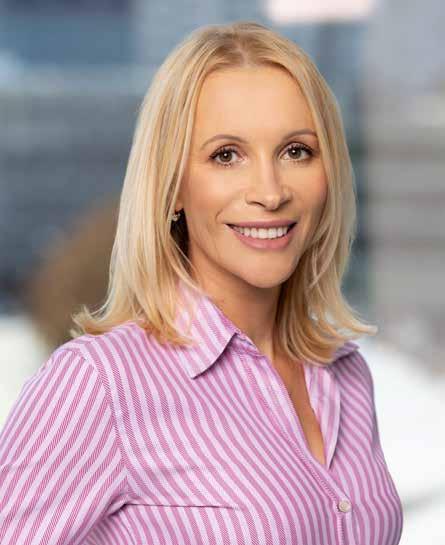
Warsaw Business Journal sits down with Anna Duchnowska, a member of the Advisory Board of Entralon Club and Managing Director – Investment Management Europe for Invesco Real Estate, to discuss her thoughts on real estate investment trends and how to find opportunity in uncertain European and CEE markets.
1.
Which trends have you observed dominating the European/CEE real estate investment market?
The trends affecting the European and CEE region are relatively similar, including geopolitical uncertainty due to the war in Ukraine, inflation hikes, and, as a result, a rise in interest rates. Additionally, we have experienced the 'denominator effect' whereby real estate allocation quotas for many institutional investors have been exceeded. If we add in the fluctuations in energy costs in 2022 and erratic construction costs, we have the perfect recipe for unpredictability. On the other hand, however, real estate as an investment class has always been an attractive alternative on a long-term basis. CPI-indexed leases provide a decent income yield in times of turbulence. Even if the valuations are under pressure, with yields adjusting to the new interest environment, similarly to many other real estate investors, we remain confident about the long-term attractiveness of this asset class.
2. What are your forecast/ expectations for 2023 from a CEE/PL perspective?
Clearly, the dominance of local and regional investors will continue, which is quite natural in times of uncertainty. However, I do not expect a substantial increase in the investment volume this year because real estate currently has to compete with other asset classes, which perhaps provide better risk-adjusted returns. At the same time, alpha-generation investors will see opportunities to access products at very attractive terms.
22 FEBRUARY - MARCH 2023 WARSAW BUSINESS JOURNAL LOKALE IMMOBILIA INTERVIEW
>>>
A UNIQUE HOUSING ESTATE IN KONSTANCIN
“Groen” means green in Dutch, while Ghelamco embodies perfectly executed real estate developments. Joining these two together could only result in one thing – modern residential housing units that reflect a passion for functional solutions and breathtakingly designed greenery.



All of this can be found now in Konstancin-Jeziorna, in the immediate vicinity of the city.
Does it sound too good to be true? Independence, freedom, greenery, and a safe neighborhood right on the border of War-
saw – all for the price of a city apartment? Well, it really exists. The perfect mix of a unique location and creative estate solutions allows for flexible price points, starting at 1,245,000 PLN for a house with a garden, with units ranging from 176 to 182 sqm.
Inspired by the Dutch building tradition, Groen’s terraced houses reflect the culture and heritage of the area’s former inhabitants by showcasing their love of openness, simplicity, and order. Bright facades stand out thanks to wooden or brick detailing. The sloping roofs are both functional and charming, and large windows highlight the spacious interiors. The houses have a floor to ceiling height of almost 3 meters and the attic ceilings reach a height of up to 4 meters.
The Kabaty Forest, Powsin Culture Park, and the Botanical Garden are
incredibly close and showcase the Warsaw region’s most lovely views and natural beauty. But even the common space of the estate reflects an outstanding union of idyllic design, greenery, and safety. With its grassy pitch and ponds with piers, complex shopping, and everyday services infrastructure, as well as proximity to the city’s best schools (e.g., The American School of Warsaw), Groen is a true enclave that offers all the best of modern city life. It is also the only offer of its kind on the local market.
It looks like dreams come true after all—and now they’re within your reach.
Find out more on groenkonstancin. com/en 600 113 113
WBJ.PL 23 PARTNER HIGHLIGHTS
3.
What sectors do you feel strongest about at this moment?
We are continuing our investment activity in the logistics sector in the region. This is predominantly driven by our convictions about the market's potential and growth. The trends around onshoring and nearshoring, e-commerce growth, and the supply chain's digitalization, coupled with the region's infrastructural development, provide sufficient comfort. We also see PRS sector opportunities due to demographic and urbanization trends. In addition, due to the high mortgage costs, we see a growing demand from tenants in the residential market. We are very active in the PRS sector in US and Europe, and there is also great potential in the CEE region going forwards.
4.
Rates are high, and it is a time full of uncertainty – does this situation open up investment opportunities in Poland?
As in other European regions, we see short-term opportunities to capture deep value in market dislocations. We could even see some gap financing opportunities to recapitalize assets or portfolios. However, we follow our conviction themes and continue to be cautious and selective.
5.
Has the war in Ukraine influenced your appetite for Polish assets?
In conjunction with our partnership with Entralon, the Warsaw Business Journal is conducting exclusive interviews with distinguished real estate professionals to exchange valuable insights and explore investment strategies that pave the way for a more prosperous future. www.entralon.club
The war in Ukraine is very traumatic. As a Polish citizen witnessing one of the most significant refugee crises in modern history, this has been a painful experience for me. At the same time, I am proud that Poles as a nation showed our solidarity with Ukrainians and provided meaningful humanitarian support to the extent possible. Naturally, this war has had negative consequences from the investment perspective, with geopolitical turbulences, inflation hikes, energy crises, interest rates increase, etc. All of those factors must be considered when investing in real estate in the region. However, we are a longterm investor who has been active in the CEE market for over 20 years, and we continue to believe that the long-term fundaments remain strong and reasonably resilient, even if we have to cope with many unpredictable factors and readjust our strategy in the short term.
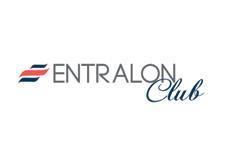
24 FEBRUARY - MARCH 2023 WARSAW BUSINESS JOURNAL LOKALE IMMOBILIA INTERVIEW
I am proud that Poles as a nation showed our solidarity with Ukrainians and provided meaningful humanitarian support to the extent possible
AN ESG STRATEGY FOR EXISTING RETAIL PARK INVESTMENTS
As the cost of new constructions grow, reducing the carbon footprint of existing retail parks can be an very effective strategy for cutting costs and meeting the demands of tenants and customers - says Brain Kober, Project Manager, LCP Properties.
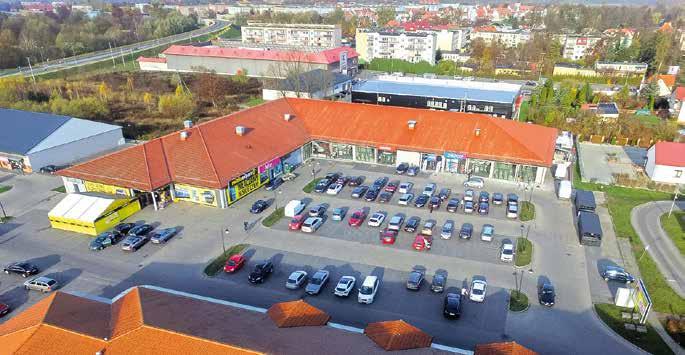
In 2023 in Poland, the modern retail park market will strive to meet the growing demands of tenants and customers. However, costs for construction and land purchases will continue to increase due to inflation and the geopolitical situation. According to Statistics Poland, the price indices for construction and assembly production have continued to grow at over 10% y/y since March 2022. It reached a high of 15.4% in December 2022 and has risen every month since then.
Increasing development costs will increase the importance of existing buildings located in convenient locations and fixed in the consciousness of the local
community. However, these existing structures, e.g., stand-alone, retail parks, and convenience stores from the 1990s and early 2000s, require a change in function, reconstruction, and adaptation to current trends in retail trade.
Remodeling a retail park is an excellent opportunity to implement solutions to reduce its carbon footprint. These measures include replacing old lighting with LEDs, collecting and using rainwater, photovoltaic panels, heat pumps, and building management systems (BMS). These are just a few ways to significantly reduce resource consumption and costs while positively impacting the environment.
The decision to remodel will also be dictated by issues related to the decision-making processes of the financing institutions. Implementing the ESG (Environmental, Social, Governance) strategy and obtaining environmental certification, e.g., BREAM or LEED, has become an essential element of the process, along with the decision to refinance the investment. All in all, lenders increasingly seem to prefer to allocate their resources to more ESG-compliant projects.
Retail’s green building landscape will continue to develop in the com-
ing years as investors and retailers realize the value of integrating highquality environmental, social, and governance into their store assets. Those who greenify their stores are using the opportunity to go above and beyond minimum requirements, sending a clear message about their stance on ESG.
PUTTING ESG INTO PRACTICE
LCP as a part of M Core Group is going to become more green in coming years. One of the assets to become more green and environmental friendly is M PARK Pisz. During the ongoing rebuilding of the M PARK Pisz retail park, we are implementing actions aimed at reducing energy consumption and increasing the comfort of tenants. We have built energy-efficient shopwindows with a lower thermal transmittance coefficient, installed parking LED lighting, replaced the old ventilation system with new air handling units with heat pumps and integrated everything within the Building Management System. The building is also being prepared for green certification.
Find out more on: www.lcp.pl & www.mcoreproperty.com
WBJ.PL 25 PARTNER HIGHLIGHTS
M Park Pisz
THE FUTURE OF WARSAW LOOKS BRIGHT
Warsaw needs to provide housing for an increasing population while making the city more resilient and energy-efficient. To deal with these challenges, city planners have utilized strategic city planning. As a result, the future of Warsaw will be green, dense, local, and convenient.
In 2023, Warsaw is about to adopt a new Studium – the city's most important planning document. The Studium is not a direct implementation tool. Instead, it provides a strategic framework for forthcoming decades of planning. It determines the future size of the city and coordinates the development of a few key aspects: mobility, greenery, public spaces, new development zones, and others.
HOUSING FIRST
Over the last three decades, Warsaw has seen unprecedented growth. But it has also experienced a drastic increase in housing prices, exacerbated by the recent refugee crises caused by the Russo-Ukrainian War.
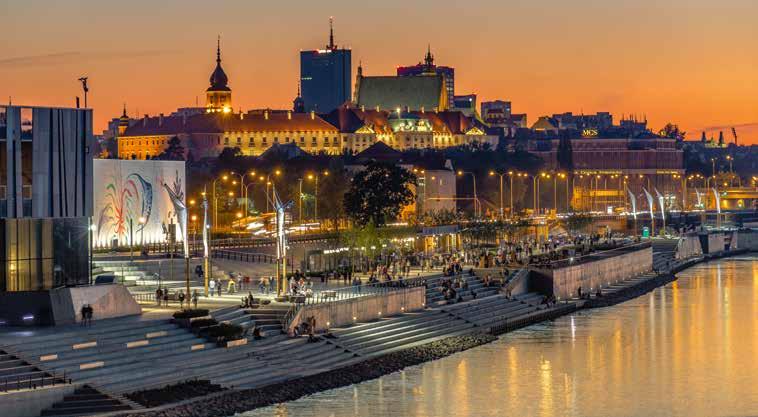
The priority of the new Studium is to provide the city with new development zones while simultaneously increasing housing quality. In addition, the Studium will coordinate the redevelopment of centrally located brownfields while limiting suburban sprawl. As a result, up to 95,000 new apartments will be built on former industrial, commercial, and railway lands.
"Warsaw has multiple brownfields that need bold regeneration schemes. We already have outstanding examples of such mixed-use investments developed in a sustainable way that benefit the city and its inhabitants," says Mayor of Warsaw Rafał Trzaskowski
The Studium will abolish strict zoning. It will be easier to mix apartments with offices and shops, develop apartments for rent and create public-private partnerships. It will also make
26 FEBRUARY - MARCH 2023 WARSAW BUSINESS JOURNAL
LOKALE IMMOBILIA EXCLUSIVE
PHOTOGRAPHS COURTESY OF THE CITY OF WARSAW
“BY 2050, EACH RESIDENT WILL HAVE A HIGH-QUALITY PARK WITHIN

A 15-MINUTE WALK FROM THEIR HOME”
planning more flexible, allowing the city to react efficiently to rapid political, climate, and economic changes. As a result, the standard of housing will increase. A more compact and mixed-use city will provide its inhabitants with better public transport, various services, and more greenery.
A THRIVING LOCAL LIFE
According to local government data, 94% of Warsaw residents like their city. They particularly love their neighborhoods, defining their "neighborhood" as the area around them located within an 11-minute walk. Hence the ambition to design a 10-minute city.
By 2050, 93% of Warsaw residents will have all their daily services available within a 10-minute walk, including a local center, a school, a park, a bus stop, a shop, or a cafe. All peripheral districts will be within reach of a tram, a local train, or a subway. They will also receive any now-missing schools and parks. Limiting suburban sprawl will reduce the costs of building infrastructure by five times.
The thriving city center will expand into Wola and Ochota and to Praga on the right bank of the Vistula river. Additionally, 272 local- and 41 district-level centers will be created. The five most important railway stations will transform into five metropolitan gateways: comfortable mixed-use districts organized around transfer nodes.
Future Warsaw will also be more healthy. By 2050, every resident will be within a 15-minute walk of recreational areas and have direct access to green walking and cycling routes. Local neighborhood centers will also reduce the plague of loneliness threatening senior citizens. This is particularly important due to demographic changes: by 2050, every fourth person living in Warsaw will be over 65.
THE HEALING POWER OF NATURE
Warsaw is already among the top ten greenest cities in Europe. By 2050, every citizen of Warsaw will have a view of greenery from their window. Protection areas of the most valuable natural area will increase by 39%. Parks and squares will double in size, and forests will increase by 11%. Residents will have a highquality park only a 15-minute walk from their homes. The embankment of the Vistula and the adjacent escarpment will become one of the
largest green public spaces in Europe, distinguishing Warsaw's central district from other European capitals.
Robust natural zones will guarantee safety. Planning indexes introduced in the new Studium will provide more greenery throughout the whole area of the city. This improved system of natural zones will constitute blue and green infrastructure, which increases biodiversity, making cities more resilient to the adverse effects of climate change. It is also 28% more productive than traditional infrastructure and costs half as much. It will make Warsaw resistant to droughts and flooding and reduce the costs of fighting climate change.
Warsaw will also decrease energy use and develop clean energy sources. All new construction will be subject to new green standards and existing buildings will undergo thermal modernization. The city will also support creating a distributed network of renewable energy sources, decrease the energy consumption of air conditioning, and continue developing electro-mobility.
The new Studium will define the spatial development of Warsaw up to 2050. While working on this document, we have learned both from the rich local planning tradition and the best practices of contemporary European planning. As a result, Warsaw will become denser but greener. It will limit sprawl, providing areas for development in the inner city. It will form a robust system of green and blue infrastructure that will make the city healthier and more resilient. "By increasing the quality of life of its citizens without inhibiting growth, Warsaw will become one of Europe's most attractive cities of Europe in which to live and invest,"summarizes Mayor Rafał Trzaskowski.
WBJ.PL 27
LOKALE IMMOBILIA EXCLUSIVE INTERVIEW

28 FEBRUARY - MARCH 2023 WARSAW BUSINESS JOURNAL
MATCH-MAKERS - FITTING IN 23 YEARS OF EXPERIENCE IN THE POLISH/CEE MARKET
INTERVIEW BY MORTEN LINDHOLM
WBJ: Let's start by getting to know you – tell us about the history of Neo-Świat.
We started the company 23 years ago when we came here from Australia. We had a business in a similar industry there already, but we realized Poland offered massive potential for what we do best, so we decided to stay.
More than 20 years ago, workers on building sites did not take pride in their work. So when we began hiring people, we took the obvious approach, starting with training and a focus on building team spirit to help them feel pride and esteem in their work.
We have built our company on certain specific values, such as trust, respect for people, creative energy, and a positive approach for which nothing is impossible. We want to do things because we do them for and with our friends, our families, employees, and customers.
We run our company as a family business based on these fundamental values. Even when part of the company, including us as management, was purchased by JLL/Tetris, we continued this approach within the larger “corporate” organization. We worked in the corporate world for 6-7 years and created a very successful business within JLL and Tetris. Honestly, we think it was recog-
nized as number one in Poland in our industry, but in the end, the differences in our values were too significant, so now we are back as Neo-Świat.
We find that flexibility and agility in business is extremely important. We still manage our own team in NeoŚwiat. That brings immense value because flexibility in carrying out work is crucial when you fit-out complex projects, especially within an office, which is a place of business. You are working within a living organism. How much can you do at night? Can you work weekends or during public holidays? Obviously, the flexibility element is enormously important – it is a must in the fit-out industry.
Did Neo-Świat also exist while you were part of JLL?
When we decided to join Tetris, we only sold off part of the Neo-Świat business. The workers doing the on-tools work, connecting the cables, fitting the corners, and painting the walls remained part of the original Neo-Świat. But, of course, they were exclusively under contract to Tetris. So honestly, NeoŚwiat has existed before, during, and now after Tetris.
When we parted ways in October last year, we sat down here with the 30 or
so key people who came with us, and we asked them a simple question: “Are you serious about getting the business back on track?” They all said: “Yes, let's go for it.”
We are nothing without our people. We always say that this business is a relationship business, which is true for 80% of the customers who come to us through our network and contacts. But it is the same internally – our people are the company's primary asset. We know we can trust [them to hold up their end of the business.] Our job is to make ends meet; we are responsible for coming up with solutions. We are the ones sitting down with the owners, the developers, and the tenants. When we promise the best course of action and the right solutions, we must have complete confidence in our contractors, partners, and employees. Therefore, people and contractors – trust and relationships –are what we stand for.
So now we are again 100% devoted to Neo-Świat, together with the 120+ people who work for us.
Can you define your new challenges and goals?
Our job consists of interior decoration and fit-out, and this includes the interior of any space. So whether it's an office,
WBJ.PL 29
WBJ catches up with the Managing Directors of Neo-Świat Paweł Brodzik and Rajmund Węgrzynek to discuss the current real estate market outlook and what makes Neo-Świat stand out from the pack.
LOKALE IMMOBILIA EXCLUSIVE INTERVIEW
retail, residential, or hotel project, we do all the installation systems all the finishes and joinery. So we call ourselves "A general interior contractor."
Contacting clients since our return to Neo-Świat, has brought an amazing response—it has not been whether we can do business for them, but rather about how much business can we do for them. This enthusiasm highlights our point about the importance of relationships in this business. Our company is built on strong personal relationships. People want to do business with you when there is trust, reliability, and care.
Rajmund [Węgrzynek] has done a huge job on keeping the market up to date with the changes that are taking place around us. He hasn’t stopped for a moment, talking to our contacts for the last three months, explaining the news, what has changed, and how we are still here for them and have never ceased existing.
We believe that there are significant opportunities out there for us. Without getting into details and figures, the real estate industry is in a difficult situation, and everyone is looking to reduce costs even by 10 - 20% for interior fit-out. In this crazy world, the clue is to be always positive – a definite opportunity for us, as we are no longer a corporate company and carry less overhead, is that now we can offer our clients a more attractive (cheaper) offer than before.
What about opportunities in Poland and the CEE?
A good aspect of spending the last six years as part of Tetris is that it was a huge learning curve for us. We devel-
oped a lot of contacts and networks in the CEE during this time. We now see this as an opportunity – because we have a great deal of knowledge about these quite different markets.
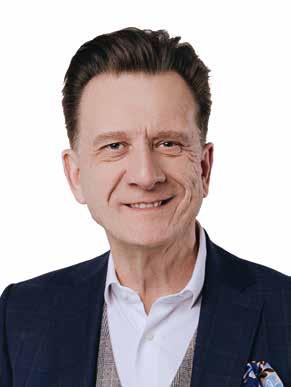
We were responsible for the CEE market and part of Germany which gave us significant insight into the external markets around Poland. We have learned about opportunities, problems, people's mentality, what the markets can or cannot handle, etc. Today, for example, when we are speaking with a client about a nice residential project in Budapest, we are suddenly recognized as experts there. So, yes, there is an opportunity.
If you are (and we are) quite well connected with a huge network of contractors here in Poland, then finding somebody from the south of Poland to manage a project in Budapest is not a problem, it's less than 500 km away. There is another sad situation, but also an unknown for the future. Nobody knows what will happen with Ukraine, but we strongly believe that this country will win. After the war it will require a lot of support and rebuilding. However, we have Ukrainian-speaking staff, the experience needed in rebuilding (since the Polish market was in a rebuilding phase back in the 1990s), and the benefit of being located quite close to Ukraine.
What is the future of your market? What possibilities do you see?
Over the last 3-4 years, we have seen an enormous shortage of labor and in generał the labour force is getting older. Naturally, companies like ours must look for ways to attract and train young and motivated people—not just
30 FEBRUARY - MARCH 2023 WARSAW BUSINESS JOURNAL
As always, we are still committed to doing what we do best because we know that the market expects nothing less
the management side of the business but also the blue-collar workers. Furthermore, the fit-out industry must focus on technology and ways to reduce tedious on-site work, such improvements must increase the flexibility and efficiency of the fit-out process. Many buildings are getting older and will require adjusting to be compliant with current regulations and expectations. Considerable investment will be required to make this happen, for example, to follow or become aligned with the ESG regulations and sustainability practices.
So, even though the market has temporarily paused, demand will grow (and then so will the prices). Opportunities are still out there. Perhaps it could be more obvious, but, for example, [aging] shopping centers are destined to be rebuilt or converted into mixed-use properties. They don't have any other option to survive, and it has already slowly started. There are hundreds of these types of assets currently in Poland.
New investors are coming in, as the market is adjusting, so we are sure opportunities will grow. We are curious about the future of the office sector. It has yet to be determined what will happen with the hybrid work model and how many square meters companies will need to match their needs in the future. However, we will know this when Warsaw starts to be in low supply.
If we look back five years ago, 2018 was when the highest amount of stock was released on the market. Now the lease agreements signed then are coming up for re-negotiation. Tenants are facing quite different choices now, versus five years ago. What they choose
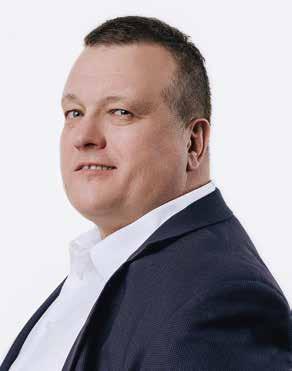
and how they adapt their new offices for the next five years will be different. It will definitely be an opportunity for companies doing interior fit-out to provide these new solutions. From your press release, I saw you are active in many sectors. Which ones are you most focused on? Office, retail, residential, and hotels are the four pillars of what we do. But, we are closely following changes [that the future may bring] regarding the industrial part of the market as a potential business line.
Looking at our pipeline, residential and hotel are the most significant drivers , and when I say residential, I mean the private rental sector (PRS), so it's not individual residential. This sector is undergoing a huge boom now. Residential with hotels is, I think, now 60-65% of the business. On top of this we also have quite a sizable retail project at the moment, which will probably take about 18 months to complete, and that will likely bring in around 20% of the revenue and the remaining 20-25% is going to be office related.
Do you have any final words? We are still committed to doing what we do best because we know that the market expects nothing less.
The market must know that we are still the same. We were Rajmund and Pawel when we joined Tetris – we are still Rajmund and Pawel now that we are Neo- Świat again. We bring the same great values and positive energy to the market. We build strong relationships, have skills and experience and have great people who are truly the key to our success in this market.
WBJ.PL 31
We have built our company on certain specific values, such as respect for people, creative energy, and a positive approach for which nothing is impossible
CEEQA GEARS UP FOR 2023
As the 2023 CEEQA Gala draws nigh, Warsaw Business Journal sits down with Richard Hallward, CEEQA’s founder and chairman, to discuss the ongoing planning for this year’s event and some exciting changes to the usual agenda.
WBJ: The appointment of international consulting firm PwC as the new Leader Partner and awards supervisor for 2023 certainly continues CEEQA’s evolution as one of the most trusted and valued industry awards platforms and one of the strongest sector showcase events in European business. But can you give us further insight about all of the “platform refreshments” you have announced as key targets for CEEQA’s 2023 campaign?
Richard Hallward: “CEE & SEE real estate in black and white”, is the promotional slogan of the 20th Anniversary edition of CEEQA. Known as the “business Oscars” for performance and achievement across 28 countries in Central & Eastern Europe and Southeast Europe, the 2023 campaign slogan highlights its reputation for the unstinting pursuit of transparency and fact in its awards processes and results - the Q in CEEQA stands for quality.
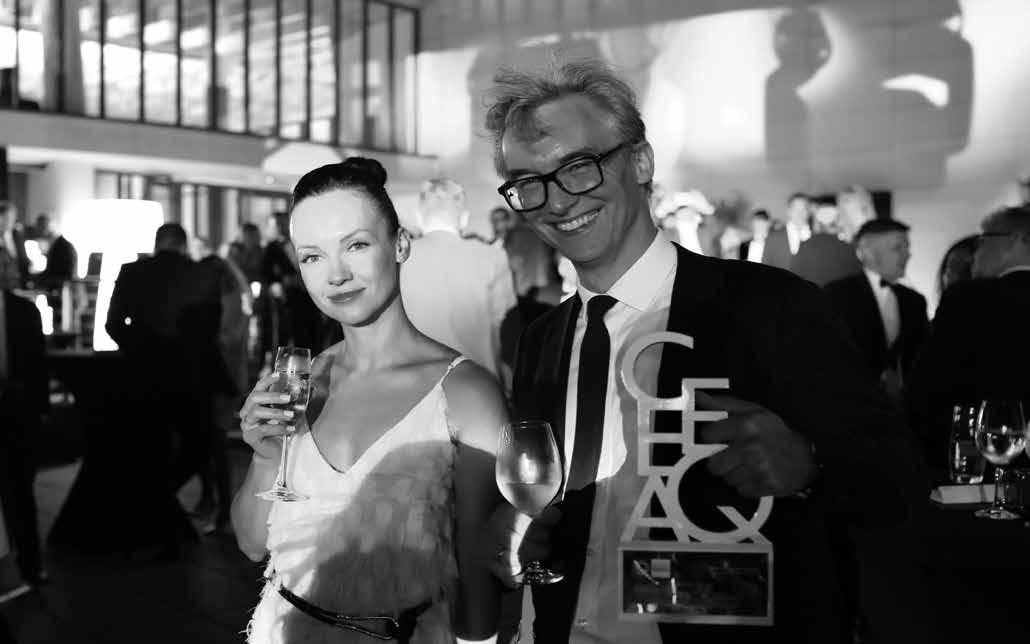
LOKALE IMMOBILIA INTERVIEW TOP: PRESS MATERIAL, BOTTOM: WIKICOMMONS 32 FEBRUARY - MARCH 2023 WARSAW BUSINESS JOURNAL
Central to this standpoint over the two decades has been the role of the awards integrity supervisor. Far from a ceremonial position, the role involves a deep and uncompromising audit of every aspect of CEEQA’s awards entry and selection processes throughout the campaign, from jury selection and judging to announcing the results. Moreover, it is a role familiar to PwC as the long-term supervisor of the Oscars.
We’re excited to be working with PwC as our new lead partner and awards supervisor and collaborating on some content areas for the 2023 campaign. Last year we were focused on getting the event over the line in recognizable shape as we returned from the pandemic’s disruption. Planning this year’s campaign, we saw an opportunity to step back and examine, improve, and, if necessary, transform each element of delivery and value. It has been a full quality audit.
Beyond this appointment, what further changes have the CEEQA team adopted to meet current market conditions?
We asked ourselves, “Is the CEEQA Gala format still best in class for current market conditions and purpose, or can it be improved?”
Do people still want to sit in a dark room, particularly at the more open outdoor Wyscigi location and new

date slot in mid-June, able to talk only to the person on the left and right for two hours under flashing lights? Or can the dining and awards ceremony format, the gala’s traditional centerpiece, be adapted to a more open and dynamic setup to enhance guest experience and business mixing value while retaining the hallmark prestige and quality of the dining and ceremony experience?
The CEEQA team put these questions into a pot and stirred. The result is a different formula, a kind of hybrid of the Grammy awards and a Buckingham Palace garden party, where companies have their own tables and meeting points, the usual exceptional hospitality and production quality, but guests are free to roam and mix.
Have ongoing events that have carried over from 2022, such as rising inflation or the invasion of Ukraine, also impacted your plans for CEEQA?
[With] Russia’s invasion of Ukraine and an escalating war on our borders affecting the cost of living and of business, [and] fuelling a current inflation crisis, who wants to hear that their prices are going up to account for rising catering and event delivery costs? [Our] new formula has enabled some cost savings on production, which CEEQA is passing on to customers with eye-catching price reductions for tickets and
commercial sponsorship.
Game, set and match. We’re confident in our skills and support to pull this off, and we know they will love it. It’s going down well with sponsors and ticket buyers so far, including a few new sponsors.
Are there any further changes we should expect? Are there any new projects or award categories on the horizon?
We’ve revamped the two Green Leadership award categories for companies and projects, one of the most competitive CEEQA categories. They’ve been renamed and restructured as the ESG awards. The campaign will also see further steps in CEEQA’s Ukraine Live Connect project launched in 2022, which aims to inform and connect regional real estate leaders with leaders in Ukraine, examining likely needs and collaboration opportunities in rebuilding post-war Ukraine.
There has been plenty of interest and suspense around the next CEEQA Gala entertainer. After all, the gala boasts a record of outstanding world-class entertainment, including recent shows by Gloria Gaynor, Morcheeba, and the Boomtown Rats. So which star will have top billing this year?
I don’t think I can reveal the full details of this year’s top act ahead of the formal announcement in March, but I am confident that it will be among the best yet. Let’s say she’s no small beer.

WBJ.PL 33
Definitely food for thought.
CEEQA23 takes place on 14 June at Wyscigi race course in Warsaw, entries for the awards close on 24 March.
We’re excited to be working with PwC as our new lead partner and awards supervisor with their high global profile and extensive experience in technical management of awards integrity processes
THOUGHT LEADER
ESG IS NO LONGER A CHOICE, IT’S A NECESSITY
Warsaw Business Journal discusses constructing sustainable office buildings in line with ESG principles and the market practices that create a competitive advantage with Jarosław Zagórski , the Commercial and Business Development Director at Ghelamco Poland.
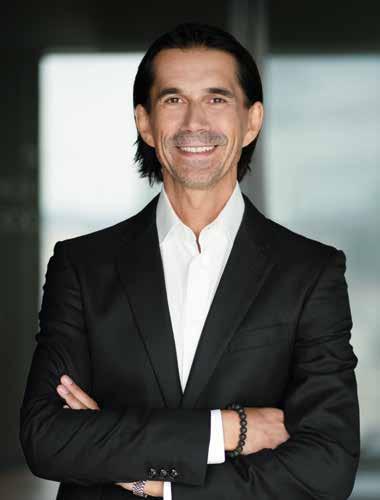
WBJ: ESG is currently a leading trend in all real estate sectors. The key elements of ESG include sustainable development, energy efficiency, and CO2 emissions. Why is ESG currently such an important part of company strategy?
Jarosław Zagórski: ESG is today no longer a choice but a necessity. Listed companies are already bound by EU regulations governing ESG reporting. Many companies are still not aware that they will be obliged to do this. What's more, they are also not aware of when they will be required to report ESG, because it will result from the verification of the company's business activity against the requirements set. At Ghelamco, we are fully aware of this and have firmly orientated our strategy towards ESG. The health and safety of our buildings’ users remain our priority. For us, sustainable development and the environment are the most important issues, which is why we are taking concrete steps to reduce our CO2 emissions and achieve energy neutrality through investment in renewable energy sources. Both tenants and investors expect this from us. These days, it just simply doesn’t pay to build in a non-ecological manner.
How do you intend to achieve energy neutrality? Surely this is a huge challenge for a development firm?
Indeed, and up until now, no developer in Poland has succeeded. We intend to achieve this through our program to construct solar farms, which we launched last year. This is the first groundbreaking project of its type in Poland, and it is both a part of our ESG strategy and an answer to the energy crisis in Europe. Since 2015, we have been buying green-certified electricity, but this is not enough for us. We wanted to take the next step to significantly limit our carbon footprint, so we decided to generate clean energy. Our strategy is to generate electricity from our own renewable sources to power our office buildings, projects under construction, and own office. In the first stage, we will build a total of eleven systems with a combined generating capacity of 10 MW. The first three farms were built in the autumn of last year. Our ambition is to achieve energy neutrality as a business by 2025. The Warsaw UNIT will be the first office tower in Poland to be entirely powered by clean energy. Freeing ourselves from conventional energy and returning to clean energy from renewable sources is not only an ecological but also a strategic move to ensure the uninterrupted operation of our business. We are already planning the development of our next solar installation and looking at other renewable energy sources. How well does [Poland] match up with the rest of Europe in terms of green construction?
34 FEBRUARY - MARCH 2023 WARSAW BUSINESS JOURNAL
LOKALE IMMOBILIA
I think Poland is one of Europe’s leaders in green construction and modern solutions. The office buildings constructed here meet the highest standards, and their certifications under prestigious systems such as BREEAM and Well have already become the standard. Warsaw UNIT undoubtedly is an example of one of the most environmentally friendly and technologically-advanced buildings in the entire CEE region. With a height of 202m and 56,000 sqm of the highest standard office space, the building is the first tower block in Poland to be certified under BREEAM with the highest rating of “Outstanding.” Every day, the super-modern Building Energy Management System (BEMS) uses 40,000 sensors and 800 meters to ensure optimal energy use. As a result of this and many other technological solutions, energy usage is almost 30% lower than in a comparable high-rise office building. Because of our program to build solar farms, the building will also be the first office tower in Poland to be powered 100% by clean electricity. By using power from renewable sources, the building’s CO2 emissions over its entire life cycle will be lowered by over 50%, while its usage of utilities will be 70% lower. Warsaw UNIT is also to feature Ghelamco’s own patent operating system, Signal OS, which comes with its own app to help tenants monitor utility usage in real-time. Moreover, we have applied anti-pandemic solutions to the building, including virus-killing UV disinfection in the lift shafts and ventilation system.
Currently, two new Ghelamco office buildings are under construction in Warsaw. Will they also follow ESG principles, and what technology are you implementing in them?

I would say they are examples of the standard of ESG real estate. The Bridge on the European Square is currently the largest building under construction in Warsaw. It will provide users with a total of 47,000 sqm of the highest-class office space. The Bridge is the first development in the CEE region to have received the prestigious SmartScore and WiredScore certificates awarded to the most intelligent and technologically advanced buildings in the
world. We are going to use low-emission materials to construct the tower block, including low-emission concrete for the foundations, which will considerably reduce carbon dioxide emissions in comparison to standard concrete and, by this, limit the carbon footprint of the building under construction. We are currently working on implementing technology to minimize water usage in The Bridge. By the end of last year, we also began construction on the VIBE office complex, which is to be the first office building in Poland to be given its own musical identity. This will become part of how this project communicates, but it will also reverberate throughout its space. This complex has also been designed in line with our ESG strategy, and it is to be certified under, among others, Well, BREEAM, SmartScore, WiredScore, and Green Standard Building. For the first two certificates mentioned, our goal is to gain the highest possible ratings of “Platinum” and “Outstanding.” The Bridge and VIBE will ultimately be 100% powered with clean energy and equipped with a BEMS.
At the beginning of this year, Ghelamco joined the Science Based Targets initiative, which supports the most ambitious industries in their fight against global warming in accordance with the principles of the Paris Agreement. Why did you make this decision?
This is another extremely important part of our ESG strategy, demonstrating our ambitions and targets in this regard. We are the first real estate company in Poland and one of only 15 other companies in the country to have joined this worthy initiative, which over 4,000 companies across the globe support. It is led by the United Nations Global Compact, the WWF, the Carbon Disclosure Project, and the World Resources Institute. SBTi bases its activities on knowledge and science, and it promotes the best practices for decarbonization and reducing average global temperature rises on the Earth. Thanks to our joining the initiative, we will be able to act even more effectively to reduce greenhouse gas emissions and combat global warming since we are allied to some of the largest international organizations.
WBJ.PL 35
Our strategy is to generate electricity from our own renewable sources to power our office buildings, projects under construction, and own office
PROF. MARCIN PIATKOWSKI ON MACRO-ECONOMICS
Professor at Kozminski University, author of "Europe’s Growth Champion: Insights from the Economic Rise of Poland”

Prof. Marcin Piatkowski is Lead Economist at the World Bank in Washington DC. Previously, he was Chief Economist of PKO BP, economist in the European Department of the IMF and Advisor to IMF's Executive Director. He also served as Advisor to Poland's Deputy Premier and Minister of Finance. He was a visiting scholar at Harvard University, London Business School and the OECD Development Center.
CEE Chairmen's Retreat
(6-7 June 2023, GrandHotel Tiffi, Poland)
By invitation & referral only. For top decision-maker level investors, developers and lenders. Places are limited. Inquiries to be sent to admin@entralon.club
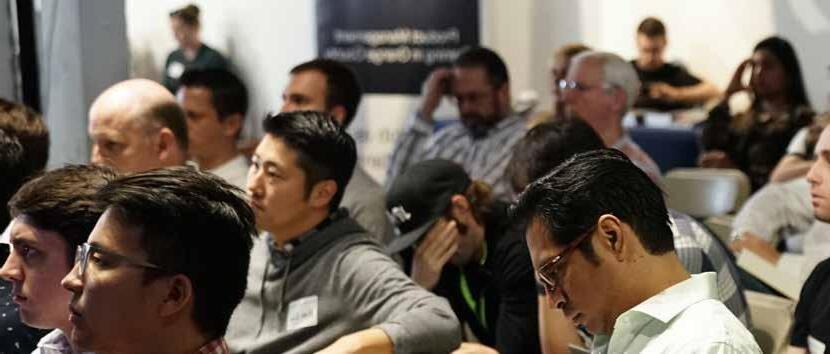
MARTIN HEALEY, ON THE REAL ESTATE TRENDS


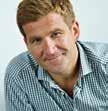
Managing Director, Real Assets at CPP Investments:
Martin Healey delivers insights and actionable advice to Real Assets’ investment committees and transaction teams on issues impacting long-term investment performance. He serves on global investment committees for real estate. Martin joined the Real Estate investing team in 2005, founded the Private Real Estate Debt group in early 2010 and established the Listed Real Estate program.
WILLIAM ALBERQUE ON GEO-POLITICS
Director of Strategy, Technology and Arms Control at IISS (International Institute for Strategic Studies)
William Alberque is Director of Strategy, Technology and Arms Control, focusing on preventing the proliferation of nuclear weapons, weapons of mass destruction and related delivery systems, as well as risk reduction and arms control at IISS, one of the world's leading think-tanks. William previously served as the director of NATO’s Arms Control, Disarmament, and WMD NonProliferation Centre (ACDC).
“Bringing together top decision-makers to openly discuss the massive disruption in the world’s economics and shocking political turmoil affecting us all to a great extent is absolutely crucial. Anticipating upcoming recession’s scale and outcomes, trying to work it through with peers, visionaries in CEE real estate market - is what we all need at this moment in time.”
Hadley
Svetlana Fedosova, Founder of Entralon Club, added:



'It is an honour to have been entrusted with organising this Retreat and to have been supported by our Advisory Board. We are aiming to convene the very top investors, developers and lenders active in the CEE Real Estate landscape. Our special speakers from London, Washington and Berlin will bring a global perspective that will enrich the discussion among participants on the foreseeable future of the CEE real estate market.
www.entralon.club/ceeretreat
-
Dean, Founder - MDC²
Pomeranian investments in 2022
Last year proved to be an investment success for Pomerania. More than 20 international organizations and corporations started projects in the region, resulting in the creation of almost 2,400 jobs.
The activities of Invest in Pomerania, an initiative coordinated by the Pomerania Development Agency, resulted in the launch of investments in the region by Capgemini, Godel Technologies and Solidigm, among others.
Also noteworthy are the inaugurations of the Siemens Gamesa competence center and upcoming investments by thyssenkrupp Automation Engineering. The 2021-2027 strategy, prepared in cooperation with the World Bank, identifies two main investment areas: in the short term, these are the electromobility, SSC, BPO, IT and ITO industries; while the medium- and long-term optics assume investment growth in the semiconductor and offshore wind industries.
in Poland INVESTING
CITY
Talent pool
In 2022, 28 investors located their investment projects in Łódź, mainly in IT, business services, and manufacturing and modern contact centers – industries that require specialists and experts.
WBJ.PL 37
In recent years, Łódź has focused on development, improving the quality of life, and attracting new investments. The city welcomes and supports both existing and potential investors.
Regional Spotlight
Pomorskie
More on Łódż >>>
IN FOCUS Łódż
in Poland INVESTING
Japanese air conditioners
One of the most important investors who recently grew their business in Ksawerów near Łódź was the Japanese air conditioner manufacturer, Daikin. The company invested in the Łódź Special Economic Zone. It plans to create 1,000 jobs by 2025. The key factor behind the decision to launch the company’s factory near Łódź was the proximity of a good network of highways and expressways around Łódź, as well as access to qualified employees.
Top Łódź Investors
740,000 people live in Łódź
3rd
largest city in Poland, after Warsaw and Kraków 4 km
longest shopping street in Europe – Piotrkowska Street
Big plans for 2023
Other investors in the area are set to create 6,000 new workplaces. The list includes: BSH, Sii, Infopulse, Capita, Fujitsu, Infosys, EY, Marel, Philips, Wella, Atos, Tate & Lyle, Mobica, Arvato, Miele, Whirlpool, ABB.
Another record-breaking year for PAIH
In 2022, foreign companies invested more than €3.7 billion in Poland with the support of the Polish Investment and Trade Agency (PAIH). This was €200 million more than last year and as much as one billion more than in 2020. The number of projects with a favorable investment decision also increased by more than 20%, reaching 126.
The upward trend in FDI was steady, but some changes have occurred. In 2021, Poland's leading investors were South Korea, Germany, and the US. Of the previous top three, only Germany has remained, moving up to first place by investing more than €1.4 billion and creating more than 4,000 jobs. Switzerland came in second, with projects of around €611 million that generated more than 300 jobs. Japan was the next largest, planning investments totaling more than €320 million to create more than 1,000 jobs. In total, last year's investments should generate nearly 14,000 new positions.
The Poland.Business Harbour (BPH) program resulted in the issuance of 44,000 visas in 2022 versus 6,000 in 2021. The companies covered by the PBH program pledged €86.95 million in capital expenditures and more than 2,700 new jobs for specialists in Poland. Belarus topped the list with 50 investment projects and the relocation of 50 companies. Other major investors included the United States (12 projects) and Germany (9 projects). The most interesting sectors for investment were e-mobility, BSS-IT, R&D, food, machinery and automotive. The greatest number of projects came from the BSS-IT sector, with 51, while in terms of project value, the e-mobility sector received the most investment, with more than €1.4 billion.
Over the year, the largest number of investment projects went to the Mazowieckie Voivodeship (40 projects), the Malopolskie Voivodeship (13 investments), and the Lower Silesian and Silesian Voivodeships, which tied with 11 projects each. However, in terms of the value of investments, the undisputed winner is the Lower Silesian province, which attracted almost €2 billion in investments.
38 FEBRUARY - MARCH 2023 WARSAW BUSINESS JOURNAL
USA Germany Ukraine Belarus France United Kingdom
Scandinavian countries
Success of the Support Program
Poland
126 investments compared to 96 in 2021
Regions ranked according to the number of investments:
• Mazowieckie
• Malopolskie
• Lower Silesia and Silesia Sectors
Investing 2022
"New high-paying jobs are being created, thanks to last year's investments. A clear sign of the change in investors' perceptions of Poland. We are no longer a country offering poorly paid labor. Instead, we are betting on qualified personnel, primarily among engineers and the broader R&D sector," said Grzegorz Piechowiak, deputy minister of development and technology and government plenipotentiary for foreign investment.
2021 = €3.5 billion
2022 = over €3.7 billion
WBJ.PL 39 New Jobs
14,000
2020 = €2.7 billion
The biggest Investors Germany Switzerland Japan Above 44,000 Recommended visas issued to workers and their families for companies covered by the program. 2021: 6000
Investments of significance for the Polish economy for the years 2011-2030 41
recommendations prepared by PAIH: 2020: 13 | 2021: 25 Over 2,700 new jobs in Poland Program Success : Poland.Business Harbour
Support
is attractive to investors
e-mobility,
companies relocated through the program
investment outlays declared
BSS-IT, B+R,
automotive, food, machinery 50
EUR 86.96 million
Bacardi Martini Polska is certified “Great Place to Work” for second time
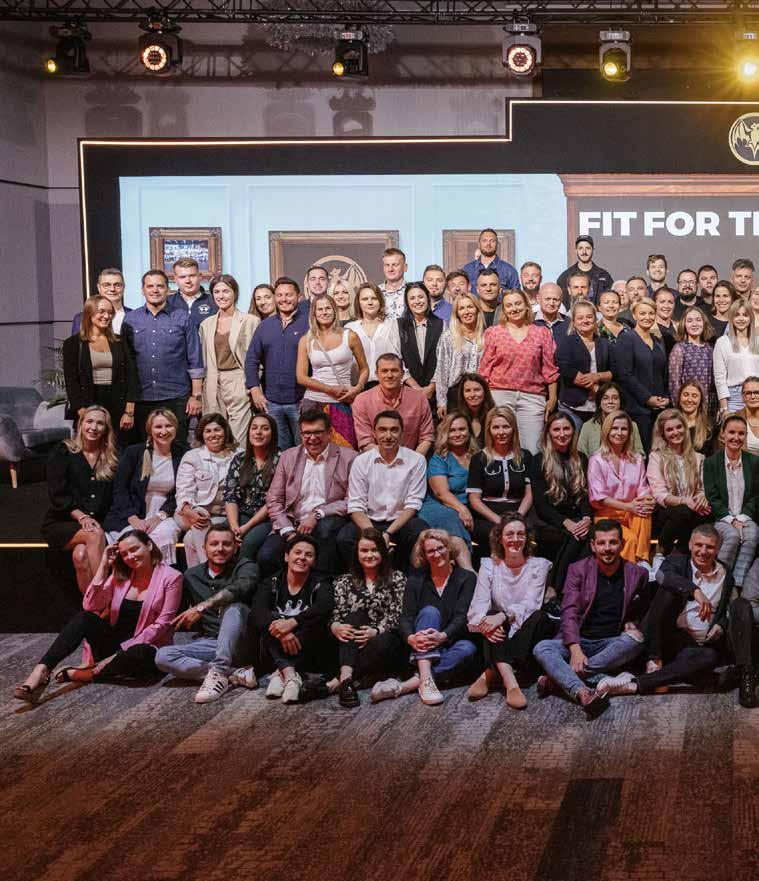
40 FEBRUARY - MARCH 2023 WARSAW BUSINESS JOURNAL
PARTNER INTERVIEW

WBJ.PL 41
Managing Director CEEBB Katya Chmykhova and HR Director CEEBB Aleksandra Paramuszczak of Bacardi-Martini CEEBB discuss how the company’s locally-sourced talent and unique work culture have driven growth across Central and Eastern Europe, the Baltics, and the Balkans.
QUESTIONS: TO KATYA CHMYKHOVA –MANAGING DIRECTOR CEEBB
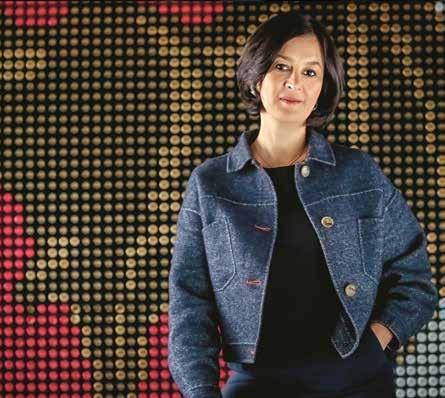
WBJ: The Bacardi-Martini Group has its headquarters for the CEEBB region in Warsaw – what made you choose Poland?
We launched the CEEBB region from Warsaw four years ago, focusing on 18 Central Europe, Baltic, and Balkan markets. Since then, our top talents have rolled out Polish best practices across all of these markets, contributing to business growth. We employ 150 Primos from nine countries, some of them have been with Bacardi for over 30 years.
What kind of investments has the company realized in the Polish market?
The Bacardi company invests in Poland and contributes to the development of the local economy by creating new jobs and growing our local team. Most recently, we have opened a shared service center in Warsaw, supporting the whole of Europe in IT, HR, and finance. Our Business En-
terprise Services support processes and interactions with clients, thanks to which it increases the effectiveness and efficiency of the company's daily operations and the achievement of business priorities supporting the BEST10 strategy.
What have been the company’s most significant achievements under your leadership?
Since 2017, our business in Poland has doubled thanks to key strategic changes, placing clear bets, and building the engagement of our employees.
Our employee engagement has grown significantly to 85%. Moreover, Bacardi now attracts top-tier talent that enjoys developing the business in all 18 CEEBB markets. For the second year, we have been certified as a “Great Place to Work.” This is a clear proof of our team’s engagement.
Thanks to this amazing team and the activation of all of our brands, we have been growing in Poland. I must also emphasize that our brands are legends— they are all iconic. Their great heritage
and outstanding quality strongly appeal to today's young adult consumers. Our portfolio is well balanced, and Martini is already the fifth most popular alcohol brand in the country, following a surge in growth thanks to the Martini Fiero launch. The foundation is also being laid to increase our success in whisky and rum. Bacardi digital, an experiential 360-degree campaign, “Do What Moves You,” and strong activation of the Dewars brand are setting us up for our next successes. We are also seeking to boost our appeal with premium consumers by focusing on Bombay Sapphire and Patron tequila. As a company, we have solid fundamentals to grow, and doubling our business yet again is a realistic goal.
What is the company's current share of the Polish alcohol market, and what are your plans for the future?
We lead in all the key categories we are engaged in: aperitifs, sparkling wines, and rum. Martini is among the top five international premium alcohol brands, along with other premium spirits—whisky and vodka. We want to be among the top three premium spirits companies by 2030 by growing our brands further and winning consumers’ hearts by increasing our engagement with them.
There is a saying – Impossible is nothing! We have already managed to double the business in the last five years. So why not double it again over the next five? We possess all the fundamentals needed to grow, and with the assistance of our outstanding team, we are well-equipped for the future. We appreciate our people for who they are, and we embrace all the differences they represent. It is important that they are engaged and a part of the Bacardi family. We encourage them to feel a sense of ownership in the company’s success. We are the largest family-owned spirits company in the world. At the same time, we are obsessed with development and clear career planning. We stick to our strategic choices. We are all about commercial excellence – we know where to engage and how to capture opportunities by developing channels with clearly identified growth drivers.
42 FEBRUARY - MARCH 2023 WARSAW BUSINESS JOURNAL PARTNER INTERVIEW
MEET ALEKSANDRA PARAMUSZCZAK –HR DIRECTOR CEEBB
WBJ: Katya talked about your certification as a “Great Place to Work,” what key qualities make your organization a great place to work? How do you create this unique environment –and why do you do it?
We are very happy that Bacardi Martini Polska was selected as a “Great Place to Work.” The award of this prestigious title was based on the result of an employee survey, which consists of an index of trust in the company and the result of an external cultural audit. As it turned out, the satisfaction rate of our employees (called Primos in the company - the Spanish word for cousins) reaches as much as 85%.
At Bacardi Martini Polska, we appreciate every employee for who they are, what they do, and who they can become. We live and breathe togetherness while cherishing the uniqueness of each of us and appreciating the diversity
About Bacardi
Bacardi Limited, the largest privately held spirits company in the world, produces and markets internationally recognized spirits and wines. The Bacardi Limited brand portfolio comprises more than 200 brands and labels. Bacardi company has been present in Poland for 26 years, with relatively steady development till 2015. Martini and Bacardi were well known to generations of Polish consumers even during communist times. Back then, Martini was recognized as an aspirational brand, an Italian icon bringing the “dolce vita” to Polish homes. Heritage brands like Martini and Bacardi, with a history spanning more than 160 years, continue to attract consumers in whatever kind of era we live in. For the past four years, Warsaw has been the hub of the CEEBB region, focusing on 18 markets in Central Eastern Europe, the Baltics and the Balkans. www. bacardilimited.com, www.bacardimartini.pl
of our backgrounds, experiences, and ideas. We also embrace each other’s differences and celebrate the varied perspectives that mirror the rich diversity of our global community.
We demonstrate living our 3F cultural pillars (being Fearless, having a Founder’s mentality, and treating each other like Family).
Being Fearless is having the courage to do the right thing. This means adopting a flexible mindset as well as a willingness to take risks. Everyone has the right to ask questions, challenge accepted solutions and introduce innovations in the company and ways of working.
Being Family means all employees and the community are treated as family. Always. Belonging to the Bacardi family gives Primos the support they need to become the best version of themselves. We act as one team, keep our promises and remain humble in action.
Being Founders – the spirit of the founders and entrepreneurship is at the heart of everything the company does,
and employees are encouraged to make decisions with the same mindset as the company's founders. On top to our key values, we always add a fourth: Fun! Because, according to Bacardi, fun is present both in the work of the team and in the lives of consumers of the company's products.
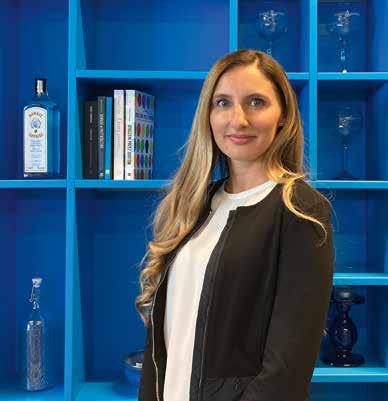
We also believe that great people can do extraordinary things. That's why Primos are given development opportunities, whether they want to learn new skills, become managers, or try their hand at work in another country, Bacardi offers a wide range of programs to help them.
The Great Place to Work® certificate is a confirmation of a high level of work culture, and is awarded on the basis of international standards. This is the best recommendation for potential candidates both in terms of providing space for development and the foundations of a sense of security. We want to maintain it, because in the next few years we will significantly develop Bacardi's structures in Poland.
WBJ.PL 43
Raben Group in 2022 –
Successfully facing challenges
With the acquisition of Austria's Bexity and entry into its fifteenth European market, investments into the fleet and infrastructure in many countries, new international connections, and ambitious sustainability projects, there is no doubt that Raben Group is still on a growth path.
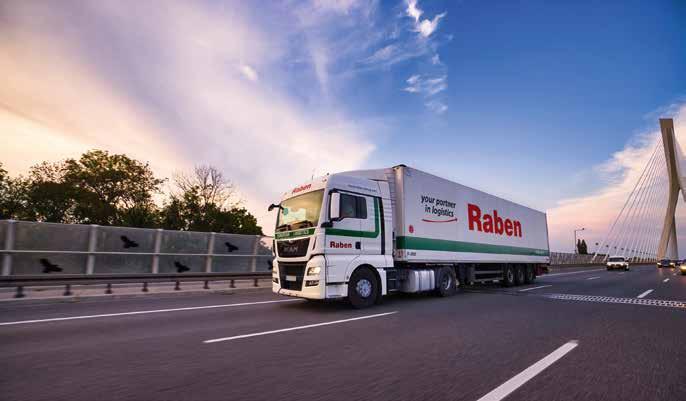
Over the past year, the challenges threatening the global economy have not dissipated - only their nature has changed. The difficulties resulting from the COVID-19 pandemic have been replaced by a scarcity of raw materials, record price increases, and raging inflation that has affected virtually everyone - consumers, service providers, and manufacturers from every industry. In addition, the TFL industry has been facing a driver shortage for quite a long time. Above all, however, Europe was faced with the great human tragedy caused by the war in Ukraine, which shook the world in many different ways.
"It was undoubtedly a very good year for Raben Group. Austria joined us in the first quarter; now, the Raben family has more than 11,000 people in 15 countries. This is a very satisfying [sign of] growthnot only in terms of increasing the reach of our operations but also in developing and improving our services. It was possible thanks to our customers, business part-
ners, suppliers, and our team of People with Drive - they all contributed to this success. At the same time, just across our border, we are witnessing a situation that should not be happening in free Europe, yet it has become a reality. Ukraine is part of our business, and we are trying to support our employees by getting involved in various aid initiatives," said Ewald Raben, CEO of Raben Group. "In these difficult times, as a company, we care not only about the people but also about the environment. That is why we implemented various sustainability projects with future generations in mind last year, often engaging our customers [in the process]. We believe that together we can do more."
In 2022, the structure of the sectors served by Raben Group remained virtually unchanged and included food (26%), automotive (20%), technology (19%), chemicals (16%), trade (11%), and non-food FMCG (8%). The range of offered services was also similar to the year before: road transport dominated (65%), followed by contract logistics (11%), FTL
44 FEBRUARY - MARCH 2023 WARSAW BUSINESS JOURNAL COMPANY SPOTLIGHT
and Intermodal (9%), Fresh Logistics (6%), sea and air (3%), 4PL (3%) and others. Despite numerous challenges, the logistics operator recorded revenue exceeding EUR2 billion.
RABEN IN EUROPE
The main event of the past year was the further expansion of Raben Group through the acquisition of 100% of the shares of Austrian company Bexity in February 2022. As a result, Raben now has depots in 15 markets and added more than 500 employees and 16 locations to its European family.

The company has also invested extensively throughout Europe, opening new warehouses or extending existing facilities in Hungary, Germany, Poland, and the Netherlands, where a new zero-emission warehouse is currently under construction and plans to be operational this year.
In parallel with the infrastructure development, Raben Group continued its extensive project to expand and reorganize its connections throughout
other parts of Europe. This endeavor was launched in 2018 in Germany and entered a crucial phase in 2021 with the inclusion of nine countries in Central and Eastern Europe and the Baltic coast. Reacting to the economic situation and the needs of customers, but also taking into account its acquisitions and investments, the operator integrates the distribution networks of the acquired companies into its system and launches new lines. As a result, by the end of 2022, Raben already had more than 600 international connections within Europe, including nearly 180 so-called groupage line hauls running between Bulgaria, Romania, Hungary, Slovakia, Czechia, Poland, Lithuania, Latvia, and Estonia. In the last 12 months alone, the Group launched more than 40 new routes in this important European region. This result was made possible also by opening small branches in each country to direct international volume exchange.
The CEE is becoming the strongest area and has overtaken the hitherto prioritized traffic between Poland and
Germany, which, despite the first signs of the crisis, managed to close with an almost 10% increase in transported volume. This is all thanks to the nearly 130 daily groupage connections, which we constantly monitor to respond to changing volume flows," summarizes Łukasz Lubanski, Raben Group business development director. "Most importantly, however, in the second half of last year, we started significant infrastructure investments in Czechia and Germany, which in the coming quarters of the new year are expected to have a profound impact on the company's development and ability to handle exports and imports from Germany to countries like Italy, Austria, Greece, Czechia, Slovakia, Hungary, Romania and Bulgaria. It is a response to market and customers' expectations in the changing economic climate and a shift in global logistics chains."
By investing in new connections, Raben will reach more places in Europe directly—not only the larger economic centers but also the smaller ones.
WBJ.PL 45
Europe's biggest challenge is to find a replacement for Russian oil and gas
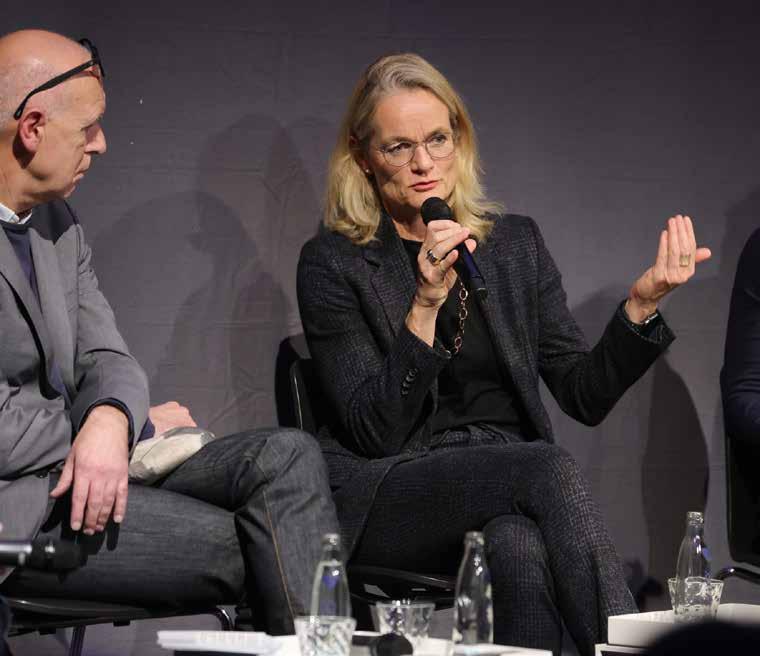
46 FEBRUARY - MARCH 2023 WARSAW BUSINESS JOURNAL INTERVIEW
The WBJ catches up wth Viola von Cramon-Taubadel, MEP and vice-chair of the delegation to the EU-Ukraine Parliamentary Association Committee, at the plenary session of the European Parliament in Strasbourg.
The main topic for today's agenda is Russian aggression toward Ukraine. It's been a year since the war broke out, Russian aggression is still the most important topic for the "collective West," and Ukraine has not been left alone… We are here in the epicenter of European Union politics, and our decisions are all directed at ensuring that Ukraine can finally win the war. What is clear for most of us here in the European Parliament is that it is not a Ukrainian war. It is instead a war in the center of Europe. It's about our democracy, our freedom, and an international set of rules. So, if we do not make sure that Ukraine succeeds, the whole continent will fail. And I believe most people in the West understand this fact. That's why we are sending financial and military aid. That's why Poland and other EU members are helping Ukrainian refugees so much, and that's why we need to send more equipment and weapons.
I am glad that the general approach in Europe to Ukraine is still very positive. We can see a vast solidarity between politicians and regular citizens. For example, recently, I was back in my hometown – a small town in Lower Saxony, Germany – and I spoke with several ordinary people. They all assured me they want to support Ukraine as long as it is needed.
What are the main challenges for European economies, including Poland, regarding the instability caused by the war in Ukraine?
The Russian war in Ukraine has revealed Europe's obvious vulnerabilities. Dependence on Russian resources and the Russian market was liable to abuse by the autocratic regime in the Kremlin. But, at the same time, we have also seen how united and decisively Europe can act in times of crisis. This has made me hopeful that we can successfully overcome these challenges if we work together.
The biggest challenge now is to completely replace Russian gas and oil in the short term and move Europe to entirely green energy in the medium and long term. And do all of this without inflicting damage to our economies, especially since growth has been minimal and many of our citizens
INTERVIEW BY NIKODEM CHINOWSKI FROM STRASBOURG
are under the pressure of inflation. So far, Europe and its economy have demonstrated considerable resilience—contrary to Putin's hopes and expectations. For example, the German economy grew moderately in 2022, and the Polish economy grew by up to 4%. Yet, inflation remains a challenge that we need to tame in 2023.
So if we decided to find a replacement for Russian commodities, would there be no way back to business as usual with the Russians? What should be the future approach to doing business with them again?
Russia has committed countless atrocities with a brutality not seen since the end of
their homes and seek refuge in the EU states. Putin is betting on a lack of patience and tolerance among Europeans. He is dead wrong again. Poland, Germany, and many other countries are harboring over 6 million Ukrainian refugees who have been exemplary in complying with the recipient country's laws and showing gratitude. That being said, we need to support Ukraine more, especially with heavy weapons such as Western tanks – Leopards, Challengers, AMX-10s, and Abrams – as well as antimissile systems so that Ukrainians have the choice to stay in their homes and contribute to the strengthening of their country from the inside.
What about the switch to internal, European-only chains of delivery and production, with no imports from China or Russia?
First, COVID and now the Russian war in Ukraine have demonstrated that dependency on autocratic states is hazardous. We, as Europeans, need to be more self-sufficient regarding energy or critical technology. We have to implement all the steps of a circular economy.
World War II. Ukraine, Europe, and the world should not forget it. There can be no "business as usual" with Russia while a murderous regime runs it. And as long as they do not offer proper atonement and compensation. Russia has to take full responsibility for its crimes and redeem itself. Only when they do that can we start talking about re-admitting Russia back to the civilized world.
Is there a risk of possible future inflow, a so-called 3rd wave, of Ukrainian refugees to Europe?
Clearly, Putin is doing everything he can to force more Ukrainian civilians to leave
Europe has one of the most technologically advanced societies, and we can utilize this potential to become the leading force in green and technological transition. Instead of outsourcing our industries abroad, we can start more ecological, ethical production in Poland, Germany, Italy, Hungary, and the other European states. However, this will require good coordination among the member states and better incentives for critical industries.
And the final question: in which aspects could Europe – as a community or as a union – be stronger after this war?
Being threatened by an authoritarian regime has been a challenge for us. We need to defend our European values and achievements with everything we have, not only militarily. We also need to fight against misinformation or corruption. Over the last year, Europeans have become more aware that it is not simply a military issue. But beyond that, we must protect democracy, the free media, and our citizens' freedom.
WBJ.PL 47
“The biggest challenge now is to find a replacement for Russian gas and oil in the short term and move Europe to entirely green energy in the medium and long term"
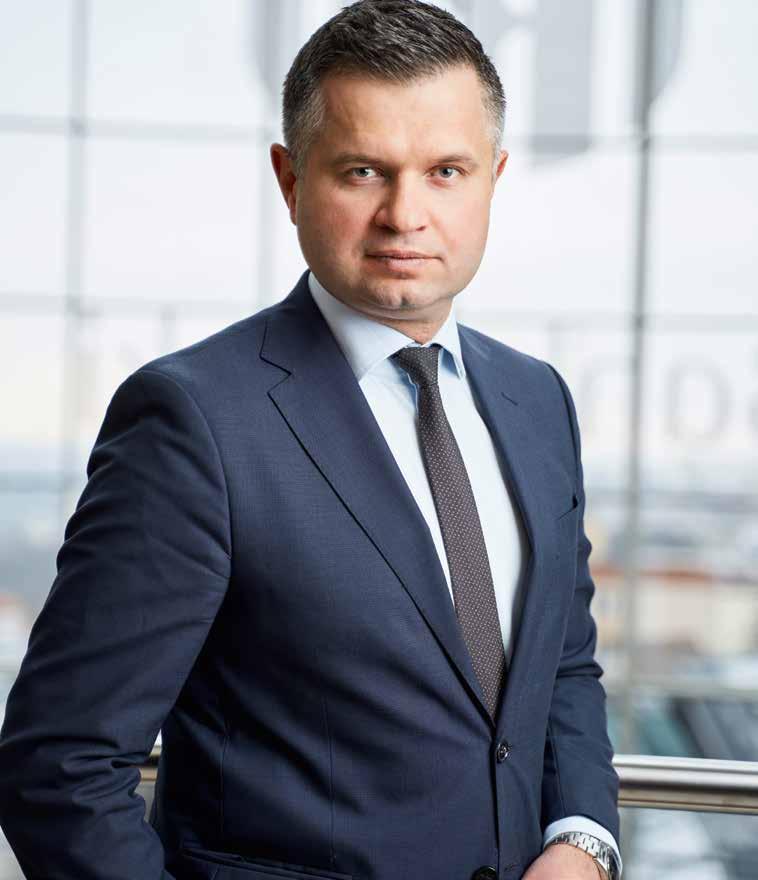
48 FEBRUARY - MARCH 2023 WARSAW BUSINESS JOURNAL INTERVIEW
Significant disinflation likely in 2023
According to Piotr Bujak, chief economist at PKO Bank Polski, significant disinflation is expected in Poland and globally in 2023. However, inflation in Poland is likely to normalize within two to three years.
WBJ: The macroeconomic indicator that will attract the greatest attention from both entrepreneurs and consumers in 2023 is inflation. At the end of 2022, we recorded a slight decrease in price growth dynamics. Is this a trend that will continue into 2023?
Piotr Bujak: It is widely expected that 2023 will bring significant disinflation both globally and in Poland. A drop in energy commodity costs and global food prices will signal this shift. A lagged effect from the tightening of the monetary policy by major central banks and the Polish Monetary Policy Council will also accompany it. Interest rate hikes in Poland between October 2021 and September 2022 were the largest and quickest in over 20 years. This has already cooled lending activity, especially in the households segment, while the narrow money supply has plummeted.
The annual average CPI inflation in 2023 will be similar to the one in 2022–above 10%. However, inflation will decline this year, a distinct change from last year’s upward trend. We will start the year at a high inflation level of close to 20% y/y in January-February due to increased tariffs on
energy. As the year progresses, however, the headline inflation rate will decline.
What factors will have the greatest impact on price growth? Can the government or the National Bank of Poland regulate inflation? To what extent are external factors important?
A big part of the current inflation shock abroad and in Poland is an inflationary impulse related to the war in Ukraine that triggered a spike in energy costs and food prices. One must remember that Russian actions led to a drastic rise in energy commodities prices in 2021, many months before the full-scale invasion of Ukraine in February 2022. Without that, inflation in European economies, including Poland, would be much lower, and not at the highest levels in many decades. They would still be at excessively high levels much above the central bank’s targets, however. The significant and underlying reason for the elevated inflation was strong demand related to economic stimulation on an unprecedented scale by major central banks during the pandemic. However, the stimulus was not halted in time, and it has fueled inflationary pressures
WBJ.PL 49
INTERVIEW BY NIKODEM CHINOWSKI
in the global economy.
In Poland, additional price pressure is connected with a very tight labor market, the second lowest unemployment rate in the EU, and double-digit wage growth. The sharp increase in National Bank of Poland interest rates is directed at the domestic sources of inflationary pressures. In conjunction with external disinflation trends, inflation normalization in Poland should occur within 2-3 years.
What is the impact on Poland’s inflation of about 2 million consumers from Ukraine? Does the sudden increase in demand for many products from an extra 2 million people really impact prices?
A massive inflow of refugees to Poland has increased the country’s population by around 5%. This is significant, and it has increased consumption demand and pushed prices upwards, far beyond the inflationary effects of the war experienced by other countries. Without a large number of
Ukrainian refugees, consumption demand in Poland – especially for basic goods such as foodstuffs, fuel or pharmaceuticals –would have been less.
Let's move on to the issue of economic growth. 2021 was like a roller-coaster–from negative GDP to over 11% growth. That base effect made a huge impact on GDP values in 2022. So what level are we entering in 2023? Large fluctuations of economic activity triggered by the pandemic and the war in Ukraine still persist. While annual GDP growth rates in 2021-2022 were positively affected by a low base effect related to the recession in 2020, the statistical effect will become negative in 2023. Even if GDP growth in 2023 will be close to zero, one should remember that it means the economy is holding on to strong gains from the depth of the pandemic recession. Normalization of Poland’s economic growth, and a return to 3-4% GDP growth, is widely expected for 2024-2025.
What factors will have the greatest impact on the Polish economy in 2023? Which components of GDP will “pull” the GDP result downwards and which upwards in 2023?
The main drag on overall economic activity will be the decline in private consumption, especially in the first half of 2023. Consumers are burdened with substantially increased debt servicing costs and their purchasing power has been considerably eroded by elevated inflation. Fixed investments should keep growing on a moderate scale, supported by the strengthening of public investment activity. The investment boom in the public sector expected this year is connected with the election calendar – parliamentary elections in late 2023 and municipal elections in early 2024 – and the fact that 2023 is the last year to use EU funds from the “old” multi-year financial framework for 2014-2020.
An outperformer on the demand side of the economy is going to be net exports as Polish exports remain resilient despite the global slowdown. Imports growth will be constrained thanks to a decline in energy commodity prices. Deterioration of export prices in relation to import prices will become far less negative than during the shock induced by outbreak of the war in Ukraine.
What are the forecasts for the labor market, the unemployment rate and wages? Will the "employee's market" and pressure for wage increases prevail?
The Polish labor market cooled a bit in late 2022 as the number of new jobs slumped and the number of liquidated jobs started to rise. However, vacancies are still high and the unemployment rate has not grown at all.
Even in a moderate recession, the unemployment rate should remain broadly stable. Overall, labor market conditions will stay tight as a few structural factors that were non-existent in previous episodes of economic downturn in Poland will absorb a decline in the demand for labor. Firstly, the nearly record number
50 FEBRUARY - MARCH 2023 WARSAW BUSINESS JOURNAL INTERVIEW
“Even in case of a moderate recession, the unemployment rate may remain broadly stable, and overall labor market conditions will stay tight
PKO Bank Polski Estimates and Forecasts
of vacancies at the starting point of the slowdown. Second, the declining workingage population. Third, a very high number of short-term immigrant workers. Fourth, employers are likely to hoard well-skilled employees as they are aware of the deepening labor force shortage in Poland in the long term. It is more reasonable to reduce labor costs by slashing bonuses than by laying off specialists that will be hard to find and employ in a few quarters when an economic recovery starts.
Last year's economic and political unrest boosted the value of the dollar. Is there a risk that the dollar will cost more than PLN 5 this year?
Given the relatively strong fundamentals of the Polish economy, for example, the country’s better fiscal situation and balance of payments position than the other major economies in the CEE region, and assuming that the Federal Reserve will end the monetary policy tightening within the next few months, our strategists expect the zloty
will appreciate during 2023. There will be periods of increased volatility, of course. However, at the end of the year EUR/PLN rate should be below 4.60 while the USD/ PLN rate should be at around 4.20.
And finally, a question about Polish exports and imports. What about the trade balance? And how will the situation in the East, and broken supply chains to Europe from Asia, impact Polish exports?
Polish exports have proved surprisingly resilient to a global slowdown. As a result, Poland is also the first major economy in the CEE region that has already started to experience an improvement in its trade balance and the whole current account of the balance of payments.
We believe that the Polish export sector's underlying strength is the still strong competitiveness of the domestic economy–mainly due to a relative drop in unit labor costs over the past few years. This, in turn, translates into still more competitive prices
of products and services than in the West. A record strong inflow of foreign direct investments in recent years confirms the importance of lower labor costs.
It is important to note that these positive trends for Poland’s export potential and the overall performance of the Polish economy has been reinforced thanks to global reshoring intensified by serious supply chain disruptions and by geopolitical shifts that accompanied the pandemic. This means that production of goods ultimately destined for Western European markets can be transferred from Asia to Europe, including Poland.
According to a recently published study prepared by global logistics giant Maersk together with the Reuters agency, Poland is seen by European companies as the most attractive location for reshoring. Thus the golden age of the Polish economy may persist, but the country has to avoid serious mistakes in macroeconomic policy and it has to tackle the challenge of energy transition.
WBJ.PL 51
3Q2022 4Q2022 2022 1Q2023 2Q2023 3Q2023 4Q2023 2023 GDP (y/y,%) 3,6 0,9 4,5 -0,6 0,3 -0,5 1,2 0,1 CPI (y/y,%) 16,3 17,4 14,3 18,6 14,1 11,4 8,6 13,2 unemployment (eop,%) 5,1 5,2 5,2 5,6 5,3 5,4 5,4 5,4 USD/PLN (eop) 4,95 4,4 4,4 4,43 4,36 4,3 4,24 4,24 EUR/PLN (eop) 4,87 4,69 4,69 4,65 4,62 4,6 4,58 4,58 export (y/y,%) 24,8 16 20,4 7,3 9,4 11 12,1 10 import (y/y,%) 27,1 18 27 6,8 6,9 11,7 11,1 9,2
Source: PKO Bank Polski
POLAND INVESTS
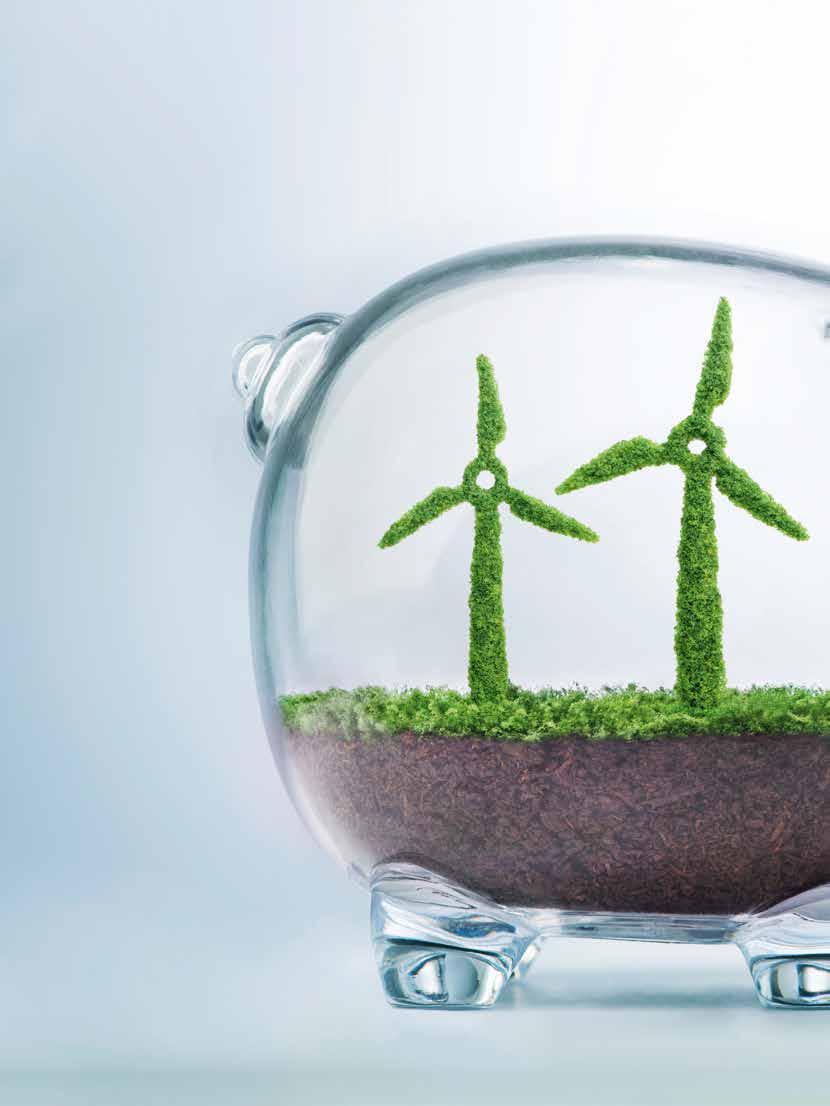
52 FEBRUARY - MARCH 2023 WARSAW BUSINESS JOURNAL
IN CLIMATE TECH START-UPS
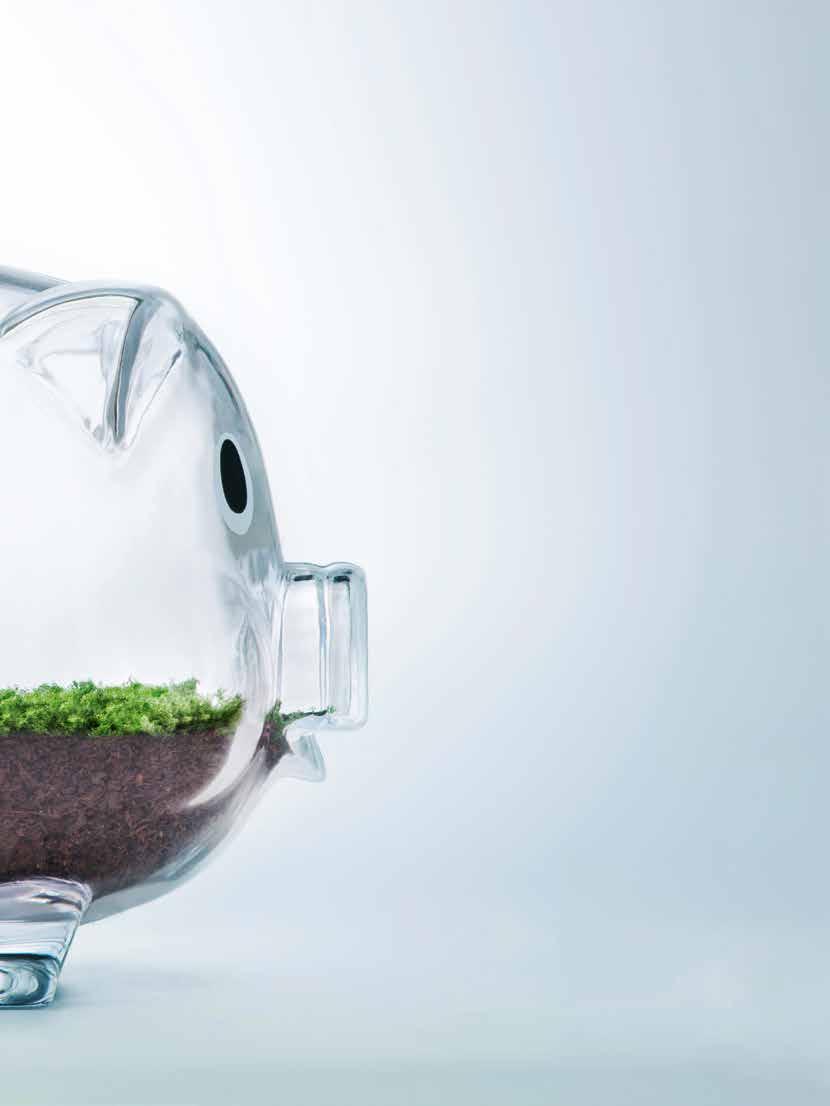
For years Poland has resisted the EU’s climate goals, with policymakers seeing a move to renewables as a threat to the country's coaldependent economy. However, even though climate tech is still at an early stage, Poland is now committed to investing millions in green start-ups
BY ANNA RZHEVKINA
WBJ.PL 53
When Małgorzata Walczak and Bartlomiej Pawlak from the Polish Development Fund Group (PFR) presented their idea to create a fund of funds (FOF) dedicated to energy transformation projects back in 2020, many were skeptical.
"When I talked about the fund three years ago, people looked at me like I was crazy. They suggested instead investing in projects with high returns, or at least combining support for green tech with backing up more general initiatives," Walczak, Investment Director at PFR GreenHub Fund of Funds, told the Warsaw Business Journal. However, she insisted on focusing on green tech.
The idea of the fund was born out of a passion for a green lifestyle and concerns over the climate change crisis. Walczak was committed to green choices since childhood when her aunt taught her to wash dishes without running water. She emphasizes that small steps such as closing the tap when brushing teeth or not wasting food can drive change. However, a significant transformation, in her view, will not be possible without the use of technology.
Pawlak, Vice-President of the Management Board at the Polish Development Fund, said a heated discussion about whether to create a fund with a very strict frame of activities that the venture capital (VC) will select or to be more generic lasted for about half a year. "Some of my colleagues said that sticking to green projects only would lower the number of funds that would be interested in joining this initiative," he explained.
"But I believed from the beginning that the idea of the green fund is an asset for a potential business, not a liability, because every technological company should be green nowadays. It is not the future of the business anymore; it's the present."
The initiative called the PFR Green Hub Fund of Funds was a success. In February, the fund announced an investment of EUR 55 million in four green VC funds. Out of forty VC funds that applied, twenty made it to the shortlist, and eventually, the fund signed contracts with four.
So far, PFR GreenHub has invested in Lithuania's Contrarian Ventures, French VC Eurazeo's Smart City fund, the US VC General Atlantic's BeyondNetZero fund, and Poland's Montis Capital. Although three out of four funds are foreign, they committed to investing part of the money raised in Poland. "I hope we will have more Polish funds joining in the future," Pawlak noted.
Pawlak says he is inspired by Polish companies developing innovative solutions like Ekoenergetyka, founded in 2009 by two students from the University of Zielona Góra who developed a charging system for electric vehicles. A major success came in 2017 when Poland launched a program to develop lowemission transport. Ekoenergetyka was the only company that could deliver charging solutions for electric buses. Now, Ekoenergetyka is present in 28 countries and employs more than 700 people.
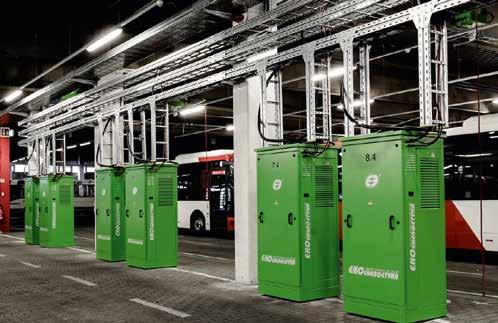
"I dream of having ten or twenty companies like Ekoenergetyka in Poland in the foreseeable future because we aim to build strong Polish technology companies that will operate on the domestic market and internationally," he stressed.
Walczak found her inspiration in Bill Gates' Book "How
54 FEBRUARY - MARCH 2023 WARSAW BUSINESS JOURNAL
FEATURE PRESS MATERIAL (2)
Ekoenergetyka
A green fund is an asset for a potential business, not a liability, because every technological company should be green nowadays
to Avoid a Climate Disaster," which presents strategies for achieving net zero greenhouse gas emissions by 2050 through innovations and highlights the role of technology in resolving climate change problems.
She noted that while numerous green start-ups provide software technologies in Poland, sectors such as food and fashion are often overlooked. "In fashion, for instance, tons of toxic polyester are thrown away, and I hope that the companies we invest in will find technological solutions to help resolve similar issues," she said.
"We believe that venture capital can bring change because each transformation is not led by the big corporations. It has to begin with the start-ups," Walczak concluded, adding that the more green tech VC funds will be present in Poland, the quicker the transformation will happen.
Climate tech investments in Central and Eastern Europe (CEE) grew from $10.6 million in 2013 to $398 million in 2020 and over $502 million in the first half of 2021 alone, according to the PwC Net Zero Future50 report, produced in cooperation with Wolves Summit. But despite being the largest economy in the region, Poland has raised only 4.65% of total climate tech funding in the CEE between 2013 and the first half of 2021.
Pawel Wiejski, the EU climate policy analyst at the Institute of Green Economy, said Poland's energy mix dominated by coal is a significant obstacle to green tech development. "We can see that specifically in the batteries sector, where none of the planned new gigafactories in the EU will be located in Poland. Manufacturers are mindful of their products' carbon footprint, which will be a growing problem in the future," he said.
Another key obstacle is regulatory constraints. Since 2016, new wind turbine installations in Poland must be built at a minimum distance of ten times the height of an onshore wind power plant between the farm wind and residential buildings. In practice, this blocked new project developments. In February this year, the Polish parliament approved a law that should make the construction of onshore wind turbines easier. However, the wind industry and the opposition were critical of the solution, claiming that the measures were insufficient.
On the other hand, Wiejski highlighted that the war in Ukraine could accelerate the green tech transition in Poland. He noted that Poland hopes to participate in the reconstruction of Ukraine and build it back with modernized infrastructure. "This is an opportunity for growth of the Polish green tech sector," he said.
Pawlak from PFR also noted that the war speeded up the transition to renewables because of the awareness that climate goals play an important role in national security. "Poland realized that a green future is inevitable, and this is a big mental shift," he said.
INNOVATIVE GREEN TECH STARTUPS IN POLAND MAKING A GLOBAL IMPACT
Although there are not many green tech companies in Poland, some start-ups have thrived thanks to their innovative solutions.
Kraków-based SEEDiA builds intelligent infrastructure for smart cities, such as solar-powered benches, bus stops, and electromobility charging stations. Founded in 2016 by entrepreneurs Artur Racicki and Piotr Hołubowicz, the company focuses on optimizing services for citizens while reducing their costs. Its solar benches, for example, are equipped with a USB port, WiFi hotspot, and inductive charges, with which people can charge a phone by simply putting it on a designated part of the bench.

Solar benches are already installed in several Polish cities, including Poznań and the famous spa resort Busko-Zdrój. The benches have a builtin cloud service that allows authorities to remotely monitor the device's status, analyze the number of users, and get data in the form of graphs.
Polish start-ups also make their mark internationally. For instance, e-mobility software developer Codetain is taking part in a project to make the island of Porto Santo on the archipelago of Madeira the first fossil-free island in the world. In 2018, a local energy supplier Empresa de Electricidade da Madeira, the Mobility House, a green tech company, and carmaker Renault signed a partnership to create technology for the project. The plan was to use electric car batteries connected to the power grid to store energy generated by renewable sources. In collaboration with the Mobility House, Codetain plays its part by developing software that supports electric vehicle chargers and makes it easier for the user to control energy consumption, storage, and distribution.
WBJ.PL 55
SEEDiA

FEATURE
Since Croatia joined the eurozone in January, Poland is reconsidering the benefits and risks of adopting the euro, with economists estimating when the move would be possible.
 BY ANNA RZHEVKINA
BY ANNA RZHEVKINA
WBJ.PL 57
OLAND is one of seven EU countries that have retained their own currency, along with Bulgaria, Czechia, Denmark, Hungary, Romania, and Sweden. The Polish government and opposition have been arguing for years about whether the country should give up its national currency of the złoty to adopt the euro. The discussion has only intensified after Croatia joined the eurozone at the beginning of 2023.
Prime Minister Mateusz Morawiecki is firmly in the "no" camp, arguing that switching to the euro would fuel inflation that has already reached a 26-year high last year. "Choosing the euro at a moment when we have such high inflation is a bit like adding fuel to the fire," he said. Morawiecki also referred to "inflation chaos" in Croatia.
"Prices in Croatia are getting higher; they have increased by 70% to 80% within one week," Morawiecki said. However, the Polish fact-checking organization Demagog claimed that the statement was misleading, arguing that according to the Croatian official statistics, prices for groceries increased by an average of 13%. In addition, the organization explained that while increases of up to 80% did occur for some services, it was only in a few particular cases.
In addition, research published by a senior advisor at the Croatian National Bank, Andreja Pufnik, showed that the country's conversion to the euro generally has a mild and one-off effect on the growth of consumer prices. "A slightly more pronounced increase in prices due to conversion was registered for a small number of products, mostly in the services sector, such as services in restaurants and cafés," the report noted.
The Polish Economic Freedom Foundation pointed out that the first twelve countries circulated euro banknotes and coins in 2002. In the first month after the adoption of the euro, the prices in the euro area increased by 0.5 percentage points. However, inflation later decreased, and throughout 2002 it remained at the same level as in 2001. Poland committed to adopting the euro in 2004 when it decided to join the European Union. But after the eurosceptic PiS party was elected in 2015, its leader Jarosław Kaczyński stated that Poland should only switch to the euro when the national economy reaches 85% of Germany's GDP per capita.
THE CENTRAL BANK HEAD WARNS AGAINST THE EURO
Apart from inflation, arguments against the euro include the impact on economic growth, already hindered by the war in Ukraine, and rising energy prices. Adam Glapiński, the head of the central bank, warned against the euro adoption, saying it would cause a "radical slowdown in the economy." He argued that keeping the zloty contributed to "Poland's economic miracle," helping the country to become one of the fastest-growing economies in Europe in the past few decades and to recover relatively quickly after the coronavirus pandemic.
The slowdown, however, appears inevitable, regardless of the debate regarding the euro. In 2023, the World Bank expects Poland's economy to expand by a modest 0.7% after a growth of 4.4% in 2022 due to the weaker purchasing power of consumers and falling demand from Poland's largest trade partners.
Jakub Karnowski, a board member of the Economic Freedom Foundation, believes Glapiński's warning is unfounded. "Wherever we look at the data for those countries that already entered the eurozone, there is no proof that growth will decline because the single currency is introduced," he told the Warsaw Business Journal.
Karnowski argues that the Polish economy is primarily hurt by inflation, which is well above the EU average. In December, it stood at 15.3% compared to the average inflation rate of 10.4% in the European Union. Blaming the central bank's policy, he says inflation would decrease in the long run if Poland joined the eurozone.
Another major argument against the euro adoption is less freedom in setting and implementing the country's monetary policy. The Economic Freedom Foundation, however, argues that if Poland adopts the euro, its central bank head will become a member of the Governing Council, the main decision-making body of the ECB. Thus, they would also be able to take part in shaping the joint monetary policy.
Still, most Poles are reluctant to give up the national currency. A recent survey by the IBRiS research center for Radio ZET showed that almost half of Poles are firmly against adopting the euro, 15.2% are against it, and only 14.7% support the move. On the other hand, business representatives are more inclined towards the euro. Consulting
58 FEBRUARY - MARCH 2023 WARSAW BUSINESS JOURNAL
FEATURE
company Grant Thornton reported that about 54% of the heads of medium and large companies would like Poland to replace the złoty with the euro.
WHAT ARE THE BENEFITS?
Adopting the euro has several clear benefits for the economy. It would eliminate risks related to fluctuations in the foreign exchange rate and simplify trade with other eurozone members. Karnowski underscores that about 80% of Poland's foreign trade is with the eurozone countries, and the single currency would lower the transaction costs. For regular citizens, switching to the euro would simplify international trips and make price comparison easier.
From a broader perspective, eliminating exchange rate risks also enhances the prospects for investment and trade. In addition, the single currency leads to greater macroeconomic stability and resilience, which is particularly important in light of uncertainty related to the war in Ukraine. Although złoty has partially recovered after dropping against major currencies in the first months of the war, Commerzbank expects the euro to appreciate further through the rest of 2023 and to rise towards PLN 4.85 in 2024. Finally, supporters of adopting the euro say that the move would increase Poland's influence within the EU, stressing that the country should not overlook the political aspect.
More than half of the economists surveyed by Rzeczpospolita believe that Poland should set a specific date for adopting the single currency - by 2030 at the latest and start the preparations. However, joining the euro is a lengthy procedure, and Poland is yet to meet convergence criteria, including joining the ERM II, the EU's system for transitioning countries to the euro. Therefore, even if this year's parliamentary election becomes a game-changer, years will pass before Poland enters the eurozone.
THE JOURNEY OF THE EURO
1999: The Euro is introduced as an accounting currency in 11 countries: Austria, Belgium, Finland, France, Germany, Ireland, Italy, Luxembourg, the Netherlands, Portugal, and Spain.
2001: Greece adopts the Euro.
2002: The Euro becomes the official currency of the participating countries and replaces their former national currencies. Banknotes and coins are issued and become legal tender.
2007: Slovenia joins the Eurozone.
2008: Cyprus and Malta adopt the Euro.
2009: Slovakia becomes the 16th country to join the Eurozone.
2011: Estonia adopts the Euro, becoming the first former Soviet state to do so.
2014: Latvia joins the Eurozone, becoming the second former Soviet state to do so.
2015: Lithuania adopts the Euro, becoming the third and final former Soviet state to do so.
The remaining eight EU countries that have not yet adopted the Euro are:
Bulgaria
Croatia
Czech Republic
Denmark
Hungary
Poland
Romania
Sweden
Arguments against the euro include the impact on economic growth, already hindered by the war in Ukraine, and rising energy
prices
WBJ.PL 59
We know that business changes are acceptable – but only those for the better. As long as the business is going well, we don't think about the changes that may be dictated by an impending crisis, a decrease in demand for certain groups of products or services, inflation, and the other factors that cause these changes. We don't think about consulting a lawyer or conducting an audit because, after all: "here and now is fine,"
What To Do W hat Not To Do I n Times O f Crisis
"I'll worry in six months," "it's bad luck," or "let's not tempt fate and do our own thing while we can." These are just some of the excuses we have already heard many times before and that have often led to the withdrawal of resilient entrepreneurs from the market. It is our job to work with entrepreneurs on a daily basis so over the past 20 years, we have heard these excuses quite often.
The truth is, however, that in a few months, you could be at a point where you will be
thanking yourself for the decisions you make now. Crises and economic ups and downs are pretty much the natural order of things – that's why economists call them economic cycles. It's all happened before, and economic booms are generally followed by years of economic slowdowns.
So why are we talking louder now about the impact of a possible crisis, which has already been forecasted for the upcoming quarters of this year? Because economic problems tend to
those sectors of the economy that deal with manufacturing, services tend to do well – or relatively better. On the other hand, changes dictated by the current situation in the world (in particular in our part of Europe) and the remnants of the pandemic may also affect other sectors of the economy, including the service sector. This impact is likely to be felt by both service providers and service recipients.
Entrepreneur, how can you help yourself? Let's think about it together.

60 FEBRUARY - MARCH 2023 WARSAW BUSINESS JOURNAL SHUTTTERSTOCK FEATURE
strongly impact
Economists call them economic cycles for a reason. But it is just as important to plan for the downs just as much as you plan for the ups. Karolina Klimek-Kaźmierczyk from Brillaw by Mikulski & Partners walks us through the 7 essentials of crisis planning that every entrepreneur should know.
1. Analyze, design, and reorganize
We're talking, of course, about costs. Don't just analyze your fixed costs. Start taking a look at the ones you're projecting for 2023. This may be the year you've been planning to replace your fleet or equipment for employees; include this in your budgets. If you still need to create projected budgets, do it now. Then periodically review the budgets you created at the beginning of the year, and verify that you are sticking to the projections you made. January-February is the last time to address this in your company.
Consider whether any overpayments/ repayments of loans you have is a good idea. Usually, overpayment of loans offers an opportunity to alleviate some financial burdens, but in the face of a crisis, it is generally good to have a financial "pillow" as a backup – so that you don't fall into needing more loans. Cost cuts usually sound enigmatic and a bit scary, but consider whether you need them. After all, it's not about freezing the operation of half the company just because you are too enthusiastic about cutting costs.
And one more thing – if you don't work with anyone on a permanent basis – hire a good accountant. We're talking about someone more than the person who files social security declarations on your behalf. This is a kind of investment, but certainly one of the most recommended ones. In our experience, the support of a tax consultant in a business's planning and day-to-day running is the key to success and avoiding problems.
2. Manage the team and communicate
Once the topic of cost-cutting comes up, it always sounds a little scary, both to the business owner and his employees. Questions about layoffs arise. However, if the correct assumptions are put in place, and the team conscientiously implements them – it can bring genuinely amazing results. What will be helpful? Certainly, an audit. In our opinion, Audits are a seriously underestimated tool in Polish companies. In companies with foreign capital, audits are periodically carried out on many company activities, from employees to costs. In this regard, the involvement of an external advisor or law firm guarantees an independent and objective analysis and the identification of potential problems and possible remedies.
It is important to understand that in moments of crisis, the organization will change. Reorganization often becomes an act of disorganization by management and employees that erodes efficiency. To avoid this chaos, speak to your employees in a way that does not lead to chaos. Although emotions can creep in, unplanned actions can eventually lead to behindthe-scenes reactions, such as employees looking for another job because, after all, "they're going to cut costs" and "I'm probably the first to be fired." But, of course, the last thing you need at such moments is to lose proven and reliable employees. So avoid scaremongering. Talk about problems as they are, but also about solutions. A review of your staff, an open conversation with your team, and an analysis with your lawyer will help avoid problems in this area.
WBJ.PL 61 >>>
“Crises and economic ups and downs are pretty much the natural order of things – that's why economists call them economic cycles”
3. Use resources efficiently
Linear economy versus circular economy – for those who haven't delved into these concepts before, we recommend familiarizing yourself with the circular economy. The so-called "circular economy" involves planning for the recovery of resources, even those which have previously been considered unnecessary. This can give rise to a new business model in your company. The Polish market has recently seen an increasing number of services and goods become available. For example, in the formula of subscription or long-term rental. This type of model of investing in the company's development allows your business to give up large one-time expenses in favor of regular small installments/payments from the services or products you need for as long as you need them.
The circular economy assumes that raw materials and products are not disposed of but remain in circulation for as long as possible. We then maximize the value of what was previously called waste. The way you use resources depends, of course, on the type of business you are running, but we know from experience that in both manufacturing and services, there are many areas to optimize in this regard, and it is possible to use them in such a way that it does not limit the business but instead increases the economic potential of the company.
4. Insurance policies
Go through the old insurance policies, renew the ones that are ending, and consider buying new ones if this is your first time using them. It's not a solution to get rid of the problem completely. Running a business always involves risks, regardless of the economic cycle and whether we happen to be in a growth phase, but to some extent, this is a way to minimize those risks. One type of insurance you should consider is the so-called directors and officers liability insurance (D&O), which provides comprehensive protection for those who hold key positions in the company in the event of claims directed at them. The scope of such insurance coverage includes civil, administrative, and criminal liability and allows you to cover a broad package of additional costs arising from your liability.
5. New investments?
We do not say "no," after all, sometimes it is necessary to say "yes" as much as possible, BUT – and there is always a "but"— always consult first with the right advisors. It is necessary to categorize the given investments (as well as expenditures of a non-investment nature) to determine whether they are profitable, needed at this stage, or only advisable. As an entrepreneur, think in the long term, count the rates of return and the amount of possible collateral at your disposal in case of any setbacks. In addition, think about how you will finance these investments, you may want to consider rental options, and sometimes a purchase or a loan will be more profitable.
62 FEBRUARY - MARCH 2023 WARSAW BUSINESS JOURNAL FEATURE
“Taking time to see the so-called "big picture" allows you to better assess risks, threats, and possible problems in your business”
6. Should you "stock up"?
Prices of goods and services are rising –some entrepreneurs are already thinking about stocking up their warehouses to catch their breath for the future. Others, on the other hand, do not want to "freeze" funds. So which option is more advantageous? We probably won't surprise you when we answer – it depends.
Do a reconnaissance of the market in which you operate to make the best decision for your business. Find out which prices will go up, which won't, and which, given the right circumstances, can come down. There is no golden mean. This solution has to be tailored to your business. For some businesses, subsidizing yourself and keeping to current prices is a good solution. In other cases where liquidity may be shaky, it may not be worth spending more than you need at any given time – a smaller working capital reserve may not be worth freezing funds.
It is undoubtedly necessary to forecast receipts and expenditures, as well as to forecast standstills – payment congestion. Along with how much our contractors owe us. In this regard, it is also worth reaching for the support of experienced financial and business advisors, who can objectively assess your company's state of affairs.

7. Don't stand stillget further training
Despite the notorious consequences of "cost-cutting," retrain your executives, managers, and managers – many practical decisions at the executive level largely depend on them. They are the ones who run your business on a daily basis. The better prepared they are, the better prepared your company will be. If you are running a smaller company – train yourself as a leader or educate the people who can support you in the face of possible organizational problems. A good practice we always recommend to our clients and partners is regular training for management and the entire team. From a strategic perspective, it is imperative to have up-to-date knowledge and competence in legal, formal, tax, financial, and security issues – these elements are critical to the continuity and sustainability of your business.
To sum up – while running your business on a daily basis, you may lack time to take a bird's eye view of your business. However, taking time to see the so-called "big picture" allows you to better assess risks, threats, and possible problems in your business. That's why we warmly encourage you to reach out for the knowledge and support of advisors and lawyers who will make running your business easier – you will be able to devote the time and energy you save to growing and scaling your business.
WBJ.PL 63
Karolina Klimek-Kaźmierczyk –expert in the Family Enterprise Initiative (IFR), attorney-atlaw in the law firm Brillaw by Mikulski & Partners, deals with compliance, competition law, public procurement, contract law, as well as day-to-day legal consulting for business.
Get a Polish business news briefing in English delivered to your inbox each weekday before 9:00
Scan code & Sign up now for a no-obligation 2-week trial.

TECH insights
ON TURING-TEST WITH CHATBOTS AND BLOG WRITING
CAN AI UPSET THE DECADE-LONG STALEMATE ON THE SEO MARKET?
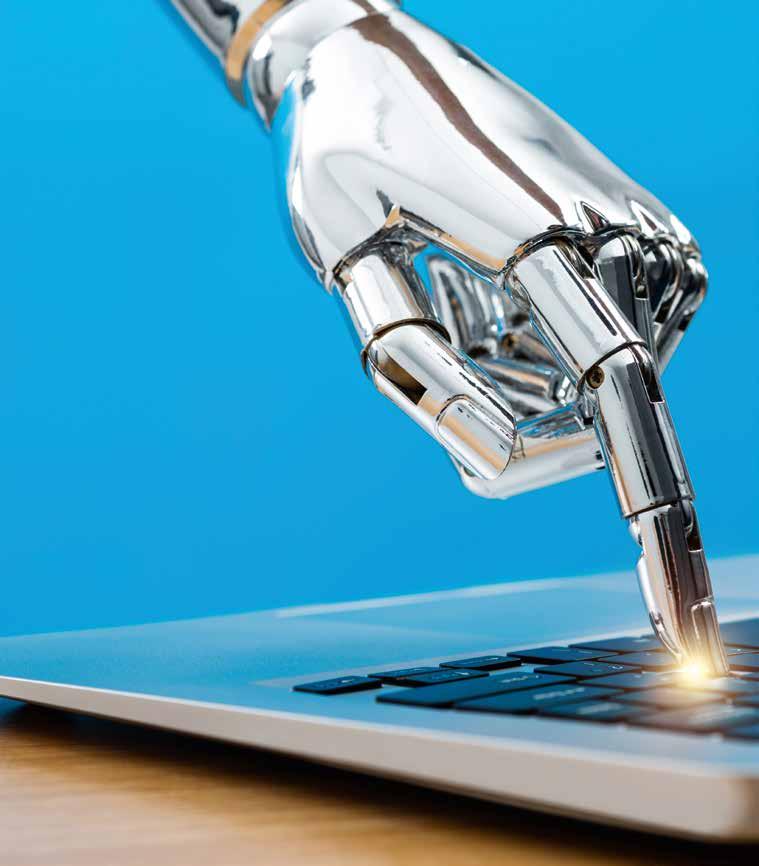 BY BEATA SOCHA
BY BEATA SOCHA
WBJ.PL 65
SHUTTERSTOCK >>>
“Did you hear about
“Yeah, that’s pretty terrible. They keep finding them everywhere they look: animal blood, newborn babies, even Antarctica!”
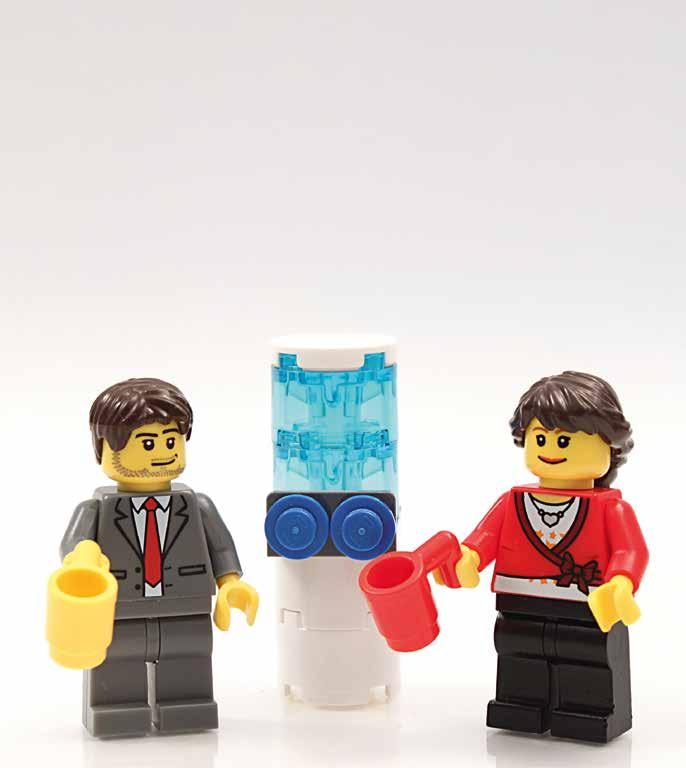
“Really?”
“Yeah, I read it somewhere.”
“Where?”
“Oh, I don’t know. Some article online.”
If your coffee break chat ever looked like this… well, you are just like anybody else. Congrats. We love exchanging half-remembered factoids with friends and coworkers. Many of us could well be considered chatterboxes. Recently we have been introduced to what seems to be a game changer: a large language model that eats the Turing test for breakfast. It also chews and spits out translators, proofreaders and even entry-level researchers. Brain-
storming when you’re not feeling 100 percent? Why bother? Just ask ChatGPT. It’ll tell you what you may have forgotten. Or at least what other people are thinking about it.
The end is near
Any new tech has its evangelists, as its naysayers. The detractors seem to be have a two-prong criticism of large language models (like ChatGPT) to offer: we are all doomed, creative jobs are no
more, we should pack up and leave. Or sue everybody for plagiarism. OR
These large language models are nothing more than a blurry image. They can carry a passingly-engaging conversation, but they don’t have anything original or insightful to say, nor can they factcheck well enough.
I see their points, both these groups have made valid arguments.
But what irks me is the latter group’s
66 FEBRUARY - MARCH 2023 WARSAW BUSINESS JOURNAL
SHUTTERSTOCK
TECH
‘forever plastics’?”
air of superiority when they warn us not to “anthropomorphize artificial intelligence.” That no matter how closely these chatbots resemble human speech patterns, they are uninsightful, repetitive and ultimately not worth engaging with.
Human enough?
The thing is, I would wager that most of our daily conversations are no more insightful, engaging or original than a five-minute sitdown with ChatGPT. Nor as thoroughly researched, as shown in the example above.
The same goes for blog posts and the multitude of stories that make our eyes glaze over on our personalized news feeds. Some bloggers have even “written” new blog posts with ChatGPT, as proof that they are not that far off in terms of readability and structure. In fact, they are almost on point, if you forgive a couple factual errors here and there.
In our image
So why do we expect a large language model, which was trained on a vast corpus of human interactions and writing samples, to be more intellectual? It is what it is precisely because it was built on our own exchanges.
And when writing an essay or a blog post, ChatGPT is formulaic and boring because this is how blog posts, and internet content, has been written for years: seemingly for other humans, but in fact for tiny little web crawlers to improve search parameters.
When you read and write blog posts for a living, you soon realize how insanely “optimized” they are. It’s down
TECH NEWS
SOFTWARE
BNP to launch IT hub in Warsaw
to a science: keyword here, H2 headline there, pack it with synonyms, expand the topic, meet the wordcount, and the rest is just gravy. And never ever forget about competitor research. Which ultimately means that the blog posts you read are almost carbon copies of one another.
The bottom line is: You get out of it what you put in. We’ve flooded the internet with mediocre, yet search engineoptimized copy and this is what we are being fed back. There’s no way around this fact, it is a self-perpetuating cycle of input and output.
Unless…
Unless ChatGPT and its brethren really turn out to be the game changer, but in a more surprising and nuanced way. Unless they upset the decade-long stalemate on the SEO market and provide an advantage, even a temporary one, to Bing or other engines, helping them win back a portion of the search market. Perhaps, it will allow us to change our search habits and thus - search results. And maybe, just maybe, the powers that be will tweak their algorithms to allow for a more varied content to make it through to the first SERP?
It is somewhat fitting that the last tech feature I wrote as Managing Editor of Warsaw Business Journal was about GPT-2, back in late 2019. And now my first tech column coming back as a contributor is about its next incarnation. Which brings me to my last point here: large language models are nothing new. Scientists have been working on them for years and years. They just figured out a few interesting business use cases that may shift the way we work and search online.
BNP Paribas Corporate and Institutional Banking (CIB) has announced the opening of an IT hub in Warsaw called B-INFINIT, with plans to hire around 250 IT specialists by 2025. The facility will support BNP Paribas CIB’s global business units such as Securities Services, Global Banking, and IT Production. The bank also plans to open a second B-INFINIT office in Krakow in mid-2023.
ELECTRIC CARS Green Cell plans PLN 300 mn in EV charger and power banks sales
Green Cell is aiming to exceed PLN 300 million ($76.5 million) in revenue this year, according to CEO Pawel Ochyński.
“Last year we generated around PLN 270 million. This year we want to do over PLN 300 million. … Besides our existing portfolio of chargers and power banks, we are introducing our first own product in the field of electromobility – the portable electric vehicle charger Habu,” Ochyński said. He expects the Habu mobile electric vehicle charger, with a maximum power of 11 kW, to reach 1% of projected EV sales in 2024.
BIOMETRICS Defense holding in partnership with AI biometric firm
Polish Defense Holding (PHO) has entered a partnership with Herta Security, a firm specializing in advanced image analytics, facial recognition, and AI-based biometric solutions.
“We do not focus solely on traditional security measures, but provide our customers with solutions that ensure proper security,” Ireneusz Pawłowski, PHO managing director, stressed.
The company gained three security services firms over the past months.
WBJ.PL 67
OPINION | NEWS
THE BOTTOM LINE IS: YOU GET OUT OF IT WHAT YOU PUT IN. WE’VE FLOODED THE INTERNET WITH MEDIOCRE, YET SEARCH ENGINEOPTIMIZED COPY AND THIS IS WHAT WE ARE BEING FED BACK.
X International Congress of Family Businesses
„Family Foundation - between hope and reality”
Poznań, March 20-21, 2023
kongresfirmrodzinnych.pl
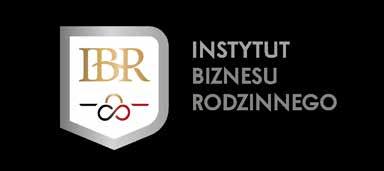
Life + Style A HISTORIC GEM REIMAGINED
FOR MODERN TIMES
Step inside the former Branicki and Szaniawski palaces and discover the magic of Warsaw's newest luxury hotel. Blending history with modernity, this chic and design-forward space is an enthralling experience not to be missed.
 BY ALEX WEBBER
BY ALEX WEBBER
Hotel Verte



Miodowa 6/8, hotelverte.com

From PLN 760
Part of Marriott’s Autograph Collection, Hotel Verte, Warsaw’s latest luxury hotel can be found inside the former Branicki and Szaniawski palaces. Rebuilt after the war on the basis of Canaletto’s paintings, this extraordinary space has an easy beauty to it: blending history with modernity, it’s a place that fires the imagination through its chic, designforward elegance. Although a stone’s throw from both the old town and the grand theater, the chances are you won’t leave the door. Exploring this newbie is an enthralling experience, and doing so will take you to the glazed all-weather pavilion, the KUK restaurant with its s-shaped signature sofa, a fancy bar and a courtyard garden that will have you wishing for the onset of spring.
70 FEBRUARY - MARCH 2023 WARSAW BUSINESS JOURNAL HOTELS/WINE
Varietal of the Month by Wine Expert
Peter Puławski
SAVORING SAUVIGNON BLANC

Sip,
Savor,
and Discover: Unveiling the Alluring Aromas and Flavors of the Perfect Wine of the Month
WHEEL OF AROMAS AND FLAVORS
Why doesn't wine taste like grapes? Wine comes from fermented grapes, where the sugars have turned into alcohol. The grape skins and seeds are removed during the winemaking process (sooner or later). The wine's taste is also affected by the varietal of grape used, the climate, the soil, growing conditions, the method of vinification, and how it was aged.
Aromas and flavors are separated into three categories: Primary - aromas from the fresh grapes, used to make the finished wine, such as fruity and floral aromas; Secondary - aromas essentially derived from the winemaking and fermentation process; and Tertiary - aromas which develop with the aging of the wine. We begin discussing the bouquet when its character and intensity evolve and become complex – incorporating all three aroma dimensions.
A 2014 Rockefeller University research showed that humans could detect over a trillion odors. The mere interaction of just three aromas in different proportions can be felt in hundreds of different sensations.
dobrewina.pl offers an ‘Aroma Wheel’ (Koło Aromatów) - an original tool to recognize and describe wine aromas and flavors - and organizes workshops teaching the world of wine aromas in practice. Please check the link in the QR code above.
The aromatic profile of Sauvignon Blanc wine
Primary aromas: Gooseberry, white currant, apple, lemon/ lime, pineapple, passion fruit, rhubarb, linden, jasmine, freshly cut grass and mint/melissa.
Secondary aromas: Minerals like flint, granite/wet gravel - from alcoholic fermentation and switching from 'hard' to 'mild' acids like Earl Grey/bergamot, yogurt/cream, orange peel and wax/saffron.
Tertiary aromas from aging - with oak handling or bottle maturation, like honey, pine, pepper/chili and clove/cardamom.
'Vinification errors' in excessive amount are wine faults, but in small proportions are naturally occurring - adding richness of flavor and deeper character, like vinegar in a vinaigrette, detectable as ‘cat pee’, vinegar/acetone and oxygenated apple. (Aromas noted with above)
WBJ.PL 71
Smoked/smokedbacon Orange/Grapefruit Lemon/Lime Vitamin C, Ascorbic Acid Pear Apple Apricot/Peach Mirabelle WhiteGooseberry Grapescurrant TuttiPassionPineapplefruit/LycheeStrawberryRaspberryfrutti /Strawberry Blackberry Cherry/CherriesPlumBlueberry/Blueberry Rhubarb Black lilac Banana Jasmine Violet RoseLavender/Lily Red/green peppersTomato/CauliflowerMint/MelissaRosemary/DillThyme/SageFreshlycutgrassHay/BlackTobaccoEarlEucalyptus/CamphorOreganoTea Grey/Bergamot FlintGranite/Wetgravel Pottingsoil Petroleum/Tar Yeast/Soy Baguette Yogurt/Cream Butter Stewedfruitcompote OverripefruitOnion/GarlicRottenegg/Burntrubber Alitmatch Caturine Forest undergrowth Ranciooxidized butter and nuts Caramel Truffles/MushroomsChocolateMusk/LeatherSweatySaddle/The Cowshed Mustywet cardboard WetdogOxygenatedapple Bandage/Rancidfat Melon/Papaya BlackcurrantRedcurrant /Chokeberry Olives Linden/Acacia Orange peel Wax/Saffron Raisin/Fig Driedplum/ApricotHoney ToastCoffee Whiskey/ToffeePine Cedar-boxwoodSandaltreeOak BourbonVanilla/VanillaClove/CardamomNutmegLiquorice/AniseCinnamon/GingerBlackPepper/ChiliCoconut/Almond Hazelnut Overripefruit Touchwood Tropical fruits Redfruits Black fruits Other fruits Flowers VegetablesFreshherbsDriedherbs Other Orchardfruits Cytrusy Mineral Yeast Fortified wines Milk Red wine CorktaintOxidationCookedwineVolatileacidity Sulfides Brettanomyces Barrel Wood Spices Nuts Botrytis Appassimento Pleśnie Fruitred Vegetative Fermentation Earth Vinification Wood aging Lateharvest Fruit- wines white wines faults
©Dobre Wina Sp. z o.o. 2023
EVENTS
The WBJ relives or looks forward to the most important events in the world of business and economy
10TH INTERNATIONAL FAMILY BUSINESS CONGRESS FAMILY FOUNDATION – BETWEEN HOPE AND REALITY
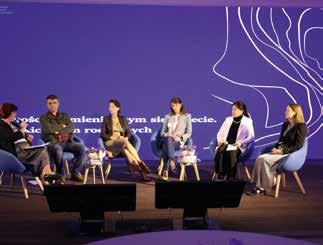
After more than 7 years of internal work, 3 years after the publication of the Green Paper, today we can really talk about the eve of the family foundation opportunity. The law signed on 7 February by the President of the Republic of Poland means revolutionary changes in the law of succession - so the leading theme of the upcoming event of the Family Business Institute has become obvious.
Johannes Kärcher - Chairman of the Kärcher Supervisory Board, son of the company's founder Alfred Kärcher - is a special guest at the Congress. Prince Michael von LiechtensteinChairman of the Board of Directors of Industrie - und Finanzkontor Etablissement will also join the lecture and discussion on family foundations. Adam Mokrysz Ph.D. (Mokate), Ewald Raben (Raben Group), Leszek Kaszuba (Jamalex), Marcin Ochnik (Ochnik), Wypychewicz family (ZPUE), Filip Makowski (YORK), Krzysztof Domarecki (Selena) have also accepted the invitation. The entrepreneurs will discuss, among other things, the following topics: supervisory boards, succession and building corporate structures in a family company, investments, current challenges in development, the successor's development path, cooperation with managers from outside the family, and external family succession, communication in difficult and crisis situations, ESG areas. During the Congress, the Institute will also award the annual 'Family Company of the Year’ prize for particularly committed and socially responsible companies.
The International Congress of Family Businesses is an unconventional event not only because of the speakers and participants it attracts. The Family Business Institute proposes participation in an interactive meeting: during the speeches of guests from Poland and abroad: family entrepreneurs, as well as experts and business practitioners, participants will sit at round discussion tables. After the lecture, there will be time for a moderated discussion by Experts of the Institute of Family Business including Szymon Trzebiatowski, Roman Wieczorek, Katarzyna Barcińska, Michał Gniatkowski, Grażyna Marciniak, Wiesława Machalica, Iwona
POLAND & CEE RETAIL SUMMIT 2023
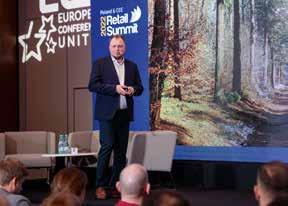
Join us for a truly exceptional retail experience at the Retail Summit 2023, taking place at the luxurious DoubleTree by Hilton Hotel & Conference Centre in Warsaw. Not only is this the largest event in the CEE region, but it is also a gathering of the brightest minds in retail, with over 1400 attendees and over 180 industry-leading speakers in attendance. Immerse yourself in a dynamic and innovative atmos-
and Ewa Więcek-Janka), for conversation and exchange of views with other Congress participants - this form of event fosters integration and enables heated discussion among 'brilliant minds' of - entrepreneurs. In addition, participants will have the opportunity for individual consultations with IBR Experts in areas related to building a multi-generational family business. Everyone will leave the event with their own partly self-written book "FAMILY FOUNDATION - IN THE DIRECTION OF LONDON" and the answer to the question: is it a family foundation for me?
Anna
phere, where you will have the opportunity to network, learn, and grow with some of the brightest minds in the industry.
Explore the Summit’s six informative stages, including the Main Commercial Stage, ESG Stage, Supply Chain Stage, eCommerce Stage, Digital Innovation Stage, and the highly anticipated Trade Collaboration Stage - a gathering place for discussions and networking, featuring a bustling retail village and thought-provoking discussion tables. In addition, on 29 March 2023, we will be hosting the grand finale gala where the 14th edition of the “Retailer of the Year” awards will be presented, providing attendees with the unique opportunity to network in a relaxed and elegant atmosphere.
Throughout the conference, attendees will have the opportunity to make new connections and network with peers over coffee breaks, lunch, the gala, and an afterparty. With such a diverse and knowledgeable group of attendees and speakers, this is an event not to be missed.
Don't miss this outstanding opportunity to gain valuable insights, make important connections, and be a part of the future of retail & CPG!
72 FEBRUARY - MARCH 2023 WARSAW BUSINESS JOURNAL PRESS MATERIAL
Rostkowska,
Bielak - Dworska, Alicja Hadryś,






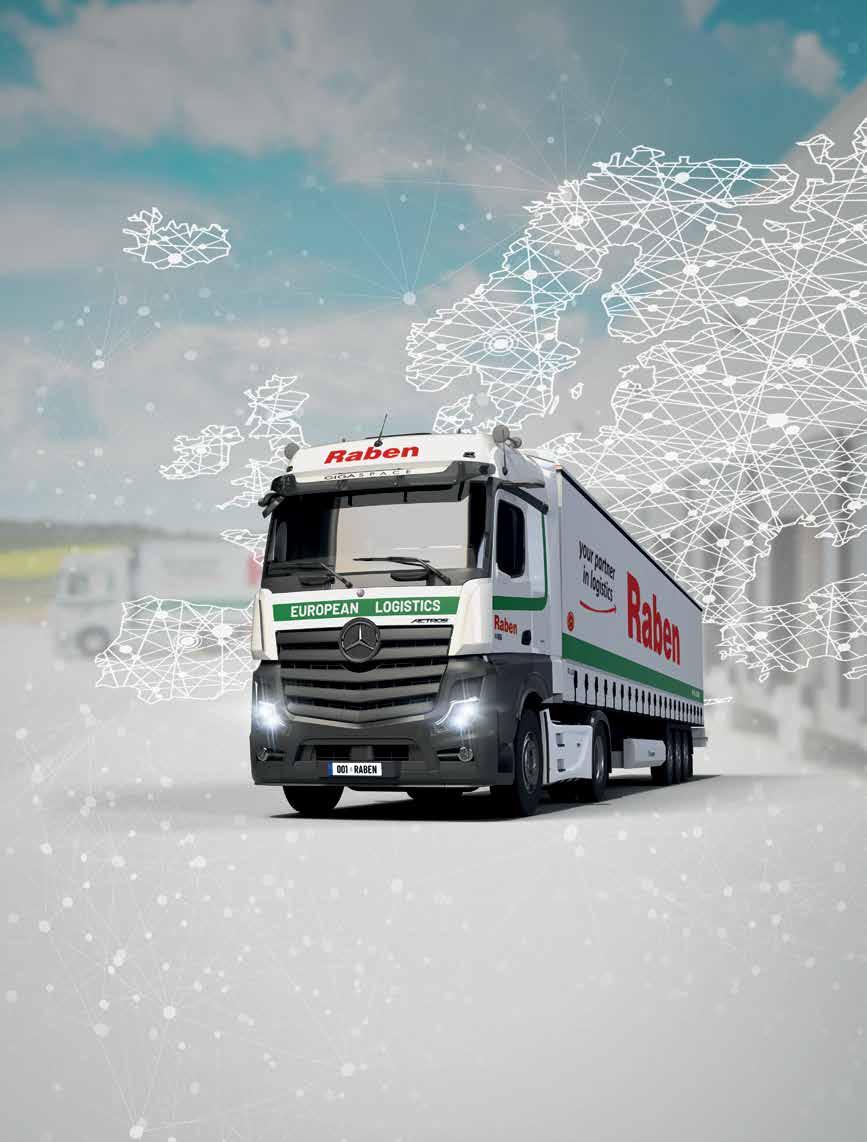









 by Karolina Klimek-Kaźmierczyk
by Karolina Klimek-Kaźmierczyk












































































 BY ANNA RZHEVKINA
BY ANNA RZHEVKINA



 BY BEATA SOCHA
BY BEATA SOCHA


 BY ALEX WEBBER
BY ALEX WEBBER
















